#the end of v3 in general will never stop getting to me
Explore tagged Tumblr posts
Text
Hey guys? I Really fucking love shuichi
#shut up me#trial 6 shuichi gets to me man. fucking hell#the end of v3 in general will never stop getting to me#cooking in the shared kitchen like ''nobody knows I can't stop thinking about shuichi saihara''#Im so glad I managed to find the shuichi figure#peace and love on planet earth. Im gonna bash my head through the floor#if anyone sees this far into the tags.... does anyone have any good v3 playthrough recommendations?#shortonegaming finished today and I can already feel the v3 shaped hole in my heart#wait what time is it right now
29 notes
·
View notes
Note
The die young animatic! I saw that in my youtube recommendations like a while ago and then I started it, was like “this seems cool” and then did something else and forgot to ever finish it so thanks for reminding me, that was really fun to watch!
And like Kaito and Kokichi’s relationship is just so good! Like I personally think I like them more platonically but I do really like oumota a good bit. I don’t really indulge in too much fan content for it though. But like you put everything about the hanger situation together so perfectly??? It’s so sad. The killing game is so sad. It just brings out some of the absolute worst in someone and makes them so scared and then that someone is just dead??? They’re never getting better? They can’t heal? They can’t live? They can’t learn to be happier? They’re just gone? And like these people could’ve had such different relationships, these people could’ve been friends? If they had just known each other?? And like my heart is broken. Shattered into little pieces. Why must I always get into such messed up stuff and get so attached to the characters? Why do I do this to myself? Why?????
Also, do you have any fanfic recs for like post game simulation stuff? Hearing you talk about it has now made me in the mood to read some
sooo the bad part about asking me for fic recs is that. i dont actually read a lot of fanfiction. i just Make it when i DO read fanfiction its normally stuff that my friends give me so i dont normally Puruse Around its like my biggest sin as a fan creator is that i love talking about how fanfiction is beautiful and that people should keep writing fanfiction and people should stop making fun of people who write fanfiction but i very rarely get the urge to go snooping around for fanfiction myself...
SO! i turned to micah kaedyu for this!
therefore you and me by unseeliekey from what i have seen and heard from micah is amazing and gorgeous even. its unfinished but micah loves the shit out of it and has reread it many a time and loses her mind EVERY SINGLE TIME. micah is generally unseeliekey's biggest fan. he really loves everything that they put out. they are unfortunately not in the fandom anymore so this is probably not going to be updated any time soon and remains unfinished FOREVER! but its still really good. i trust micah's judgement for the most part
steps from your pulse by kaylenep SOOOO fun and has sleepy shit mixed in here so you know that i like it. this is a really sweet fic im glad that micah sent it to me
and that is about it. there was another one but i didnt really like it so im not going to recommend it. it just. it was so Hopeless. and i dont like hopeless narratives or endings which is ironic because i like danganronpa and specifically love v3 the most
8 notes
·
View notes
Text
Thoughts on the 3rd ep of Hypmic Rhyme Anima+. Spoilers beware
Season 1 | Ep.1 | Ep.2 |
i love how its samatoki who tsks when ichiro talks, they never stop and i love it fuugen looking dude still has a great design love the fact that they kept the Ramuda is scared of ghosts plotline ww TBH is a silly name DJ or not, but it does tie in some ARB lore eyyy joint mission! does that mean that nagoya and oosaka will be enemies? might be and interesting naughty busters and MCD interactions OFC theres gonna be some good good ichiro/kuko and samatoki/sasara KUKOOO I LOVE YOU the kinshachi! love those little dudes, they're tiger-headed dolphins lol JYUSHIIII you chuuni dork i love your flowery wordss Mr. Kuko wwwwwwww nooo amandaaaa so ripped up oh more visual kei!! i am so happyyy www this villain is so silly i love silly villains. how unfortunate that they'll be plot slaves but they genuinely had something fun going on awww look a kuko being silly and amagani being a silly lawyer LETS GOOO JAKUHITOOO eyyyyy lets go grandmaaaa the MVP of repairing Ichikuko relationship lets gooo naughty butters!!!!! i love themmmm were they also a influence ichiro to get onto the right track? thats sweet ofc they had to tie in different characters together still love that sun shadowing them the moment they talk about the villains the squeakkkkkkkkkkk amanda thats so cuuteeeeee awww no magical girl transformation? rip -
Damn the imagery on this MV goes super hard i love the non-traditional stuff you'll find scattered around at a glance the ones i spot are: buhddist funeral rites with from, what i can count 39 candles which can mean thank you… those funeral flowers look like white chrysanthemums (grief, honesty, truth which the later two may be nods to the fact that they're not in their right minds), pink, and purple carnations which symbolize capaciousness and unpredictability Kuko also references gokurakujoudo which is the most well known higher buddhist celestial land known as the land of bliss so basically he's saying that he's so hot shit that he'll reincarnate into the holiest of holy lands Ragnarok is the end of the known gods according to nordic mythology aside from like. two gods and two humans which means either Jyushi is a ghost as shown in the scene or he's just that cool and survived Kuko's second verse is a reference to old paintings that depicted monks training their spiritual disciplines by mountainsides. if you're an old soul like me, think Libra Dohko's Mnt. Roshi Hitoya's second rap scene is mimicking an egyptian depiction of a weighing of the heart, specifically it seems to be parodying the scene found in the Papyrus of Hunefer. interestingly, the three opponents are on the side in which the feather of maat is commonly depicted on, the thing which the heart is weighed against while Amanda is the heart Hitoya and Kuko's spots on the papyrus is where anubis would be, setting them as the judges who preside over this battle. Jyushi is also sitting where Ammit, the devour of the dead, would be depicted sitting. Ammit is also a goddess, which is fun Given the red moon behind him, Jyushi also plays at a fallen angel The chorus' first scene is another very famous generic buhdist scene. while i don't think it references anything specifically, the three sitting on lotus flowers and the bodhi tree's in the back implies that they are buddah. like no joke, they are actually buddha don't know if this is actually a reference, but the red hell-like place that the three find themselves in might be Sañjīva, one of the buddhist naraka's where those who are reincarnated there are born fully grown and are attacked by other people and monsters return of the kinshachi! kaleidoscopic imagery which is also heavily associated with buddhist imagery That ending is a reference to the spider's thread by ryunosuke akutaguwa! you might remember it if you've played Danganronpa V3 but its a story about a man trying to escape from hell from a spider thread but ultimately falls back into hell because of his greed - that Obaaachannnn is so cute. and the bait and switch was so silly Kuko as always is just the absolute star of the show even if the spotlight isn't on him Huh???? Are Doppo and Hifumi okay???? Please??? you can't just cliffhang that???? how dareeee
Badass Temple endingg lets gooooo Kuko verson is so cute!!! that illust tooo Jyushi is just so stylish and silly, treading that fine line. also is that just water in his champagne glass www this is such a fun ending version i love it. Its just a lot warmer and more comforting in my opinion, super sweet and heartwarming. a lot more electric guitar as well
I'm so glad for their first feature episode I really enjoyed BAT! The song was such a banger and the imagery along with it so evocative. I really liked the episode how it brought everyone together for a chaotic jaunt. I hope next week with dotsuhompo will be just as silly
#hypmic#hypnosis microphone#Hypnosis Mic: Division Rap Battle: Rhyme Anima+#hypnosis mic rhyme anima#hypmic spoilers
3 notes
·
View notes
Note
May I ask..... what is in your post game V3? I dunno how to ask this without sounding weird.
HM!!!!!!!!! GOOD QUESTION;;
I mostly only have braincells for Kiyo and Angie so not a lot of my thoughts are straying from that unfortunately LMAO, I was able to branch off a bit answering this though so thank you for indirectly helping me develop more!!
But I like to think it's the same scenario as the second game where it was all just a simulation. I know what I fantasize about is a VR AU and that "postgame" tends to refer to the survivors but literally none of my favorites survived so reality can be whatever I want: postgame Shinnaga is so canon it's unreal!! I'm sure there's probably a VR fic for them somewhere out there in the world, I wouldn't know because I suck at reading fhdjfk, but I would love to write my own someday HEH
-------------------------
They'd all wake up one by one as they die and end up all in the same facility where they're taken care of by the Danganronpa team, unable to leave until they’re well again due to the contracts they signed prior to playing-- Meaning Angie wakes up, Tenko wakes up a few hours later, Kiyo another few hours later, etc. Angie jumps back pretty quick from things so she'd be already VERY excited to see Kiyo* after watching the trial, mostly because Angie like immediately caught onto what his sister really was to him (HINT: CONTROLLING AND AWFUL) and yelling at her screen saying "GOD WILL SMITE YOU ALL FOR PICKING ON THE WEAK" at everyone just calling him some incestuous freak during the trial. Angie does have genuinely incredible intuition (thanks god!) so she looks past the fact he murdered her Scarily Fast. Everyone would definitely mistrust and hate Angie even more as she tries to preach to them afterwards about Kiyo and how they need to forgive him since he’s a victim and God (most important opinion) already forgave him, but no one ever listened to her anyway especially postgame so it’s all in vain 😔
*whom might take a bit to wake up and fully acclimate again because...idk this man was boiled alive that's kinda Fucked I think all the executed would take longer to wake up because they went through more lengthy + traumatic deaths I guess? This just means even more time for Angie to sit on her thoughts about what happened to her+Kiyo yuh yuh
Everyone becomes a mix of their pregame selves and the identities they were given, they'd end up being mediocre/average (sometimes bad) at what their handpicked talent was but a lot of them still keep up doing it until they DO become good again. A very small amount of them try to replicate their killing game outfits and kinda live off the high of being what they once were and accomplished in their fake memories, like Miu and Himiko. (this also makes me think about Irumeno a bit more 👀) Pretty much every single one of them in pregame saw themselves as nothing, being disposable enough to be in a killing game (even if it turns out to be virtual), so the new identities would overpower the mix for the most part since they’re the more intensified and dramaticized personality--IF THAT MAKES ANY SENSE LOL.
--Angie absolutely never stopped her art and has a less intense view on Religion, since garnering more experiences in life she’s just be less intense in general I'd think; more open with her emotions in that she'd actually cry, but still very manic and bubbly and optimistic nonetheless. After getting help (mostly from Kiyo who deals with the same thing), Angie is able to differentiate her thoughts and desires from “God”’s thoughts and desires, YEA she still has a funky little friend in her head. She's not AS pushy especially not with her equally traumatized fellow killing game participants but she still absolutely gets her moments of intensity and assertiveness now and then if she thinks something God is telling her is absolute truth and for the betterment of everyone: she is still Angie afterall, truly believing everyone would be much happier with her God in their lives but having enough self-restraint to know everyone will just push her away further if she tries to help them in that regard. She has her moments of desperation but most everyone’s too far gone from her already.
--Korekiyo is such a complicated one--I do like to think of pregame Kiyo as transfem/nonbinary and that would partially stick into his postgame identity in some way...killing game Kiyo was Just A Dude but after becoming the mix of the two identities he'd be VERY confused, especially with the influence of his (simulated) sister's influence. (genderfluid time? :)) He'd have varying degrees of when his...sister...alter...thing...comes out, or is present in his head in any regard, she'd be gone or slowly disappearing from his mind for months at a time and he'd initially be extremely unstable about it because he feels extremely isolated and lost when he can’t talk to her, but he's got Angie by his side so he becomes significantly less stressed about it over time, learning to cope with it. Eventually he finds himself no longer dependent on sister and...has to learn a SECOND time to not be unhealthily dependent; on Angie this time. (funky little idea I’ve been wanting to draw/write about sometime...hnnrngm) They’re both miracle workers when it comes to each other’s mental health it’s kinda insane. Of course, after realizing that Sister never really existed, he harbors near-immediate guilt for having murdered Angie and Tenko once he’s alone with his thoughts, not being puppeteered by sister, realizing everything he ever did he did for HER and realizing how fucked it all was pretty quickly--he does crave interacting with his victims in a positive and healing light but he’s sort of traumatized by it all to the point he is TERRIFIED when they’re around him at first.
--Tenko ends up EVEN MORE protective and grudgeful after she wakes up, trying to shield everyone and everything from most of the blackened, absolutely makes Kiyo manage to feel like even worse shit when he's got 1 extremely supportive and loving woman he killed and 1 extremely spiteful woman he killed who might legitimately murder him in return if he’s not careful. Tenko never makes amends with Angie and becomes close with Himiko (who's close with Gonta despite Tenko's wishes (she hates him for killing Miu, local woman)), managing to keep Himiko far far away from Angie, not only for "stealing" Himiko in the Student Council but also for the fact Angie's glued to Kiyo's side--making her the second least trustworthy person to Tenko..
--Himiko is very traumatized after the game due to surviving all the way til the end, likely making her (along with Shuichi+Maki) very disillusioned and lost--unable to decipher anything from fiction or reality--it takes a long time for Himiko to really “accept” anything; tried to cling to both Tenko and Angie but ends up just stuck on Tenko, mourning the loss of her friendship with Angie while doing so. Himiko would probably be shoved away from Gonta at first as well, but Tenko felt a lot more confident in Gonta so after a long while of her aggressively trying to teach him manners and keeping an emotional deathgrip on him whenever he wants to interact with Himiko, they’d end up close friends again. Still thinking about Irumeno-- Also with the whole ~~Survivor Delusions~~ thing, I think that helps play into Himiko’s attachment and insistence to keep up her old magician identity, because she has a very hard time trying to tell what’s real n fake ykno, and it takes her a while to realize she doesn’t have her talent anymore; absolutely ending in tearful breakdowns and unending determination to find herself again by forcibly trying to improve and push herself to her limits.
For the most part Kiyo and Angie are outcasted from everyone else, a lot of that being due to Tenko's preaching but...also everyone just doesn't understand what actually happened to Kiyo and they are all deathly worried about Angie, but not enough to get themselves involved; they're scared of Angie too, afterall, not as much as they're scared of Kiyo but ykno-- They think her naivety and determination to “fix him” is going to get her murdered again, every day they’re just counting down the minutes until it happens again. (spoiler alert: it doesn’t)
I could ABSOLUTELY go off more but I really have to end this at some point so fhdsjkfds--
TLDR;; Angie (and God alter) forgive Kiyo almost immediately. Sister alter likes to disappear sometimes making Kiyo sad and unfortunately dependent on Angie. Both Kiyo + Angie help each other heal and recover from their issues. Tenko hates both Kiyo + Angie with a passion and protectively forbids Himiko from seeing either of them. Himiko is close friends with Tenko and Gonta and Maybe More with Miu.
#not art#ask#anon#korekiyo shinguji#miu iruma#gonta gokuhara#himiko yumeno#angie yonaga#shinnaga#irumeno#MAYBE...#my problem with it is so stupid its like#i really like kiibouruma maybe i just throw himiko in there too...... AUGH#4+ poly ships always wrack my brain but i might go with it haha RUNS#kiibourumameno#LMAO#postgame#vr au#postgame au#au
58 notes
·
View notes
Note
Can you explain the fantastic four volumes? Why are they separated like that, are they different continuities, should i read them all, who wrote which, and such? They‘re very confusing to me
Welcome to the terrible world of comics renumbering, aka the reason we have volumes. The long and short of it is, at some point, the big comics publishers got it into their heads that more people would buy their comics if they had easy jumping spots, the logic behind this being wouldn't it be more friendly for new readers to pick up an issue #1 than an issue #389? Which, sure, in theory, until you have, for example, six different Fantastic Four #1s, some of which were published very close together, and then no one knows at first glance where the hell they should start. But Marvel persists in this practice anyway because for some reason they think that one of these days it's actually going to work. So yes, unless otherwise noted -- because volumes are a publishing quirk and not a specific continuity quirk, so for example something like Spider-Gwen, which until recently took place out of the main continuity, has multiple volumes -- they're in main continuity, with the notable exception of Fantastic Four v2, kind of. I'll get to it. As to who wrote what, it varies -- some volumes have a ton of writers on them, some only have the one, like Fantastic Four volumes 4 and 5. It kind of depends on the length of the volume. Should you read them? It depends on if you're looking to be a completionist or not. If you're still confused, that's because it's unfortunately a feature of this particular system, not a bug. It is not a new reader friendly solution to having a huge series with hundreds upon hundreds of issues, despite the fact that Marvel just will not stop doing it.
If you look at most long running Marvel series, you'll probably note that most of their "volume ones" are actually extremely long -- Fantastic Four v1, for example, lasts from issues #1-416. The first renumbering takes place in 1996, and this one kind of has a good reason behind it. In the mid-90s, Marvel was, how can I say this nicely? A complete dumpster fire, and I don't mean from a storytelling perspective. In 1996, Marvel temporarily outsourced production of two major titles -- Fantastic Four and the Avengers -- to the studios of former employees Jim Lee and Rob Liefeld. This outsourcing took the form of what appeared to be a "hard reset", especially for the Fantastic Four, who during v2 got an updated '90s origin story with updated '90s costumes and updated '90s personalities, essentially brought back to the beginning of their continuity without memories of their previous iterations. This is because, as it was later explained, though the Fantastic Four and the Avengers seemed to die in the main continuity, they were actually sheltered in a bubble reality by Franklin Richards. It's. You know. It is what it is. So essentially, volume 2 of Fantastic Four (1996) takes place in a separate continuity -- you can skip it and not miss much. Volume 3 (1998) picks back up in the main continuity when the Fantastic Four return to their own continuity and try to pick their lives back up while the world has moved on without them. It's VERY good, from a characterization standpoint -- a lot of volume 3 is written by Chris Claremont, who handles all the characters with an extreme amount of nuance. From a plot perspective -- I mean, it's totally fine as long as you don't care about anything making sense ever. Claremont was not here to write a coherent plot; he was here to write extremely an extremely insightful and sensitive Johnny Storm, and I applaud him for that.
This is where the numbering gets messy again, though! Because you know what looks really dramatic on the front cover of your comic book? A big ISSUE #500. So when volume 3 was approaching what would be, in what's called legacy numbering, issue #500, they switched the numbering again. Fantastic Four goes from Fantastic Four v3 #70 straight to Fantastic Four #500. There is no Fantastic Four v3 #71, something that can be confusing for new readers who are JUST trying to follow a book from issue to issue. From my perspective, I'm generally in favor of a return to legacy numbering, because it really is so much simpler to just have whatever number the issue actually is on the cover instead of having to be like "Fantastic Four issue #499 is actually Fantastic Four v3 #70." But Marvel hates simplicity! Loathes it! We need more new readers! Who definitely will pick up anything labeled #1 and not worry about THAT WHOLE MESS behind them! So while Fantastic Four retained the legacy numbering for 88 issues, it soon switched things up again when the entire title of the book was renamed. When Johnny dies in the Negative Zone in Fantastic Four #587, the book was renamed from Fantastic Four to FF (just the initials) to reflect the change. This is a creative decision that I don't personally hate -- I think it makes its point well -- but also it really makes this entire period of Fantastic Four hell to read when the book comes back with Fantastic Four #600 after 12 issues of FF, but the FF title also remains, and the two are supposed to be read interchangeably at that point. Good luck figuring out how that one's supposed to go on first glance and thanks a lot, Marvel.
After Hickman's run wrapped up with Fantastic Four #611, Marvel entered a period where it was relaunching a lot of its main series basically every year. This is why there's a Fantastic Four v4 (2013), closely followed by Fantastic Four v5 (2014). These are basically one writer brief runs that are encapsulated in their own volumes for very little reason, especially since towards the end of Fantastic Four v5 it reverts to legacy numbering once again, with the last four issues of the run being Fantastic Four #642-645. Congratulations, nobody could have thought of a worse system. Then there came the three year Fantastic Four publishing ban (a real thing that happened) and when the book relaunched in 2018, it was with Fantastic Four v6, which is still using its own numbering, with issue #36 just released. It's essentially like that scene from Pacific Rim about how the kaiju keep coming faster and faster, except, you know, with comic book runs.
So here's a very basic reading order: Fantastic Four #1-416 -> Fantastic Four v2 #1-13 -> Fantastic Four v3 #1-70 -> Fantastic Four #500-588 -> FF #1-12 (at which point FF separates into its own book with three separate volumes) -> Fantastic Four #600-611 -> Fantastic Four v4 #1-16 -> Fantastic Four v5 #1-14 -> Fantastic Four #642-645 -> Fantastic Four v6 #1-36.
That brings you up to the present, not counting series like Secret Wars (2015) which slots in between #645 and Fantastic Four v6 #1, or things like annuals, which are issues published sometimes annually that may be standalones or may be important to the main plot, you can never be sure. Comics are terrible.
As for whether or not to read all of that, like I said above, it kind of depends on you as a reader, whether you're a completionist, whether you bounce hard off certain decades or creators, etc. There's really no one right way to tackle a comic series that spans 681 issues and six decades, especially not when the publisher doesn't exactly make it easy for anybody to keep track of what exactly they're supposed to be reading next. I do hope that clears up some of the confusion for you, though, even though the truth is the way a lot of American big two comics are published are, very simply, in an incredibly confusing, extremely new reader unfriendly, archaic way.
35 notes
·
View notes
Text
Warning- spoilers for the end of danganropnpa v3
(massive essay is below the read more I think I spent like half an hour on this I’m not even joking😅)
Ok so I recently finished danganropnpa v3 and I have some theories on what the ending meant
At the end of the game tsugumi says the following:


She essentially hints that the killing game was copied from something, and that I believe is copied from the first two killing games.
We know that Tsugumi says that the first two games were also a tv show just like v3 was, but if that were the case why would she say that she was copying something? I believe that she saw these two killing games and took inspiration from them to make them into a tv show.
Junko enoshima had a massive influence on the world, with people named the remnant’s of despair helping spread that despair across the word. It’s clear that more people will have been influenced by her over time, with it starting out as just students from hopes peak academy and eventually many others will have likely joined over the years.
A group named future foundation was then set up, with Makoto and the rest of the survivors from trigger happy havoc joining them to spread hope around the word and put a stop to the global despair. We never get confirmation of they succeeded with that goal, however in danganronpa v3 we see that the outside world is back to normal, however the only thing strange is that society seems to have normalised the killing games being broadcast globally, with v3 being the 53rd season meaning it is clearly very popular. My theory is that something happened over time which instead one side winning (this being hope v despair) the end result was actually somewhere in the middle.
I imagine that the future foundation were able to get the chaos to die down or stop completely. However because this disaster had been going on for so long it had become normalised in the world for people to be killed and for despair to always happen. Because of this when society returned to ‘normal’ years and years later (I believe it was mentioned that v3 was 100 years in the future) they were actually used to despair and it would still be occasional to see despair take place even though the outside world was mostly peaceful. I believe that society became quite twisted and began to see killing/despair in general as a sort of entertainment. It wouldn’t surprise me if because they were so used to it they would find life boring without it. (Honestly it kinda gives me hunger games vibes with the rich people watching everyone kill eachother as entertainment (I haven’t seen it so I think that’s what happened??))
And this is where tsugumi got her idea.If she also felt the same way about this and also enjoyed hearing about despair on the news and seeing it in the media I believe she then decided that a killing game tv show would be really popular around the globe. If she were to copy the killing games set up by junko enoshima then the world would definitely enjoy it, after all that’s what lead to them all having these ideas in the first place. It’s likely that if junkos killing games had been broadcast to the outside world then it will have been documented somewhere, and potentially would be available for the public now to watch, meaning that the current world would know everything about it and would enjoy there to be more of it.
We also know that in v3 all the participants were eager to join the tv show before they were turned into fictional characters. Shuichi says in his audition video ‘I’ve always been a big fan of danganropnpa and always wanted to be in one. If I were a contestant I would be the ultimate detective. I know there’s been a few in the past and I’ve always loved those characters. I know there’s been a few in the past and I’ve always loved those characters so I would want to be one of them. Ah but I don’t have to be a detective, I’ll be anything just to be part of the show. And I mean that, I’d do anything to be part of danganropnpa. I promise if I get selected I’ll work as hard as I can. I will come up with the best, most gruesome murders! I promise! Everyone will love it! An ultimate detective hasn’t been the blackened yet so I’m sure I can do that! I’m also thinking about the perfect punishment for an ultimate detective’
Shuichi clearly showed a huge for the killing games and really enjoyed them. The fact that he also had ideas for gruesome and interesting killings along with making ideas about his own punishment and being really enthusiastic about it shows that he was willing to sacrifice his and other people ls lives for the sake of the show. We also get an insight of kaede and kaito when they auditioned and they also seemed very excited about it too, showing how corrupt society had became, all due to the work of junko enoshima and tsugumi shirogane.
Obviously this is just my theory about the ending of danganropnpa so obviously it’ll be different to others, but I thought it would be cool to talk about my ideas because it’s really interesting about what could have potentially happened
#danganronpa v3#danganronpa spoilers#v3 spoilers#long post#I think this is the biggest essay I’ve ever written#spoiler demon but purple
2 notes
·
View notes
Text
Remember that analysis post of mine debunking the ridiculous myth perpetrated in this fandom that Kaito never apologises, in which I discuss how he actually apologises way more than he should? Well, while thinking about and writing that post, I also got curious. What’s the cold, hard data on that? What if I just straight-up counted every single instance of each character apologising throughout the main story of DRV3, in order to be able to indisputably prove at a glance that Kaito is actually one of the most apologetic characters in this game?
…I wasn’t willing to go so far as to play through the entire game again just for the purpose of counting every time a character apologised, mind you. But several months ago, I began watching yet another V3 Let’s Play – and since I was already committed to watching said LP all the way through, I figured I could count all the apologies as it went along and collect that data with minimal extra effort on my part. So here’s the full dataset, at last!
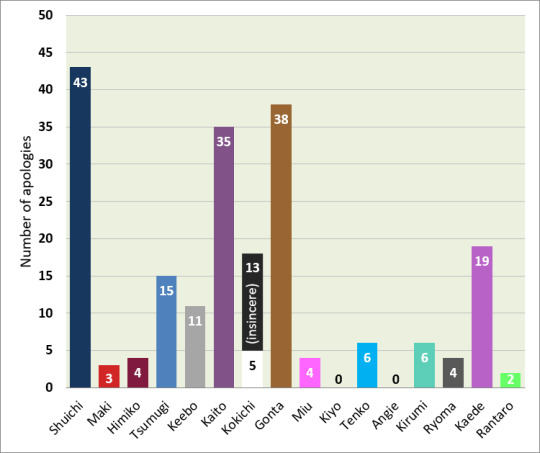
There we go. It is objective and indisputable that Kaito apologises the third-most out of any character in this game, behind only the incredibly insecure Gonta and the still-rather-insecure-and-has-the-most-lines Shuichi. And pretty close behind them, at that!
I noticed a bunch of interesting things while doing this, though, so I can’t resist the chance to break this down and talk about it in some more detail.
Data collection criteria
For the sake of Scientific Thoroughness, I should explain my exact criteria for counting these. Every way of phrasing an apology, be it “sorry”, “my apologies”, “my bad”, etc, was counted. I also decided to count statements along the lines of "I need to apologise for this", because that itself is essentially already expressing the apology, too.
If a character apologises multiple times for the same thing, each of those times counts separately. This isn’t a measure of how many individual things each character apologises for, but rather of how inclined they are to apologise. Even if multiple apologies are grouped together, such as “Sorry… I’m so sorry…” or “sorry, my bad”, those still count as two, because that’s essentially a double-strength apology.
I did not count optional dialogue that was mutually exclusive with other optional dialogue. Which is to say, I didn’t count any FTEs, since you can’t get all of them in a single playthrough, and as much as I might like to insist that Kaito’s and Maki’s FTEs with Shuichi should definitely be considered canon, I’m trying to be unbiased here. I also didn’t count any FTE invitation dialogue, even though you technically can get all of the first parts of those (the lines before you actually make the choice to invite someone) in a single playthrough, mostly because it’d have taken forever to go through them for absolutely everyone.
However, I did count optional dialogue in those bits where you’re free to talk to everyone in the room before advancing the plot by talking to a specific person, because that can all be assumed to be canon. The bonus item scenes also count, because they should be assumed to be canon, too. There may have been some apologies that I missed here, because the LP I was watching occasionally missed these bits of dialogue, and while I tried to check myself for these missed bits, I may have overlooked a few. But if so, it was definitely only a few and not enough to significantly affect the overall picture of the data.
I only counted Shuichi’s and Kaede’s apologies when they were spoken out loud. It’d be unfair to count their inner-monologue apologies as well when we have no idea how much any other character might also be apologising in their head.
The pregame characters’ apologies were not counted, because they are not the same people. I would have counted Tsumugi’s and Rantaro’s apologies prior to the “reset” if they’d had any, since they are already themselves from the very beginning.
Obviously there’s still a lot of inherent bias here towards the characters who get more screentime and more lines, such as especially Shuichi. There isn’t much I can do about that, short of counting the exact number of dialogue boxes that every single character has throughout the whole game and using that to normalise things. As you can imagine, I don’t want to do that. (Though, on the extreme off-chance that someone does somehow happen to have data for that lying around somewhere that they can access with minimal effort, I’d love for them to send it my way.)
Characters who totally never do anything wrong
I was not at all surprised to see that Kiyo and Angie never apologise for anything at all, sincere or not, warranted or not. Psh, what do you mean they might have done something wrong, of course they never do anything wrong ever.
Miu almost ended up on the zero-apologies list, too. Interestingly, the four times she does apologise in canon dialogue are all during the Virtual World trip. Three of them happen when people are frustrated that she isn’t telling them stuff about the Virtual World sooner, and one is for being about to murder Kokichi in the flashback to that. Since she never apologises at all the entire rest of the time, this is a neat sign that she actually does feel pretty guilty about deceiving everyone and plotting to get them all killed.
In another effort to be as objective as possible, I also counted every apology regardless of how sincere it was. However, in Kokichi’s case, I did keep a track of how many of his apologies were actually sincere, out of curiosity. (Other characters may have a few insincere ones here and there, but it only felt worth my time keeping track of that with Kokichi, because he’s obviously the biggest offender for this.) I included this information on Kokichi’s bar of the graph, because I feel that the implication otherwise given of him being the fifth most apologetic character in this game is deeply misleading. If you discount all of Kokichi’s screamingly insincere apologies, suddenly his apology count is just unremarkable background noise on par with most of the others.
It is notable – and also very unsurprising to me – that Kokichi’s five actual sincere apologies are all for things that, according to Kaito’s principles on this, he doesn’t really need to be apologising for at all. They are all within chapters 1 to 3. He never sincerely apologises for any of the many things he actually does wrong that really do warrant being apologised for, because Kokichi is totally never in the wrong about anything, you guys, and he definitely doesn’t ever murder anyone.
Three of those five sincere apologies happen when he’s hit his head during investigation 3 and is dazed and disoriented. Apparently Kokichi needs to be literally injured in order to be made to feel like anything is his fault for more than a brief moment. …That said, that evidently only works for accidental slip-ups that aren’t really his fault at all. Kokichi’s totally-never-in-the-wrong-about-anything defence mechanisms work full time to protect him from ever having to acknowledge and feel remorse for any of his many very real and deliberate misdeeds, even when he’s painfully poisoned and dying.
Kaede
Kaede’s apology count is very notably high for someone who was only alive for one chapter. If she’d stayed alive for longer, she’d almost certainly have rivalled Shuichi for total apologies. (So, technically, Kaito is probably only the fourth most apologetic character in this game. Still, though.)
You might assume that Kaede’s high count here is because of the murder she does, but actually only like two or three of them are related to that. Most of her apologies are evenly spread throughout the entire chapter. Some of it’s just general politeness, but an awful lot of it comes from her being too inclined to feel bad over not being as good a leader as she wishes she was, when she really hasn’t done anything wrong at all. Kaito is right to try and encourage her not to apologise when things aren’t her fault! She of all people needs to hear that!
Chapter-by-chapter
The majority of the rest of the characters aren’t that interesting to talk about. For the most part their low counts are basically just, like, background noise politeness, a vague measure of how polite that character is and nothing more. Very little of those counts has anything to do with how insecure that character is, or any actual things they do wrong that genuinely warrant apologising.
But for the other three of our most-apologetic characters, since they’re alive for several chapters, it’s kind of interesting to look at how their counts fluctuate from chapter to chapter. So here’s another graph, to help me break their huge counts down a bit more.
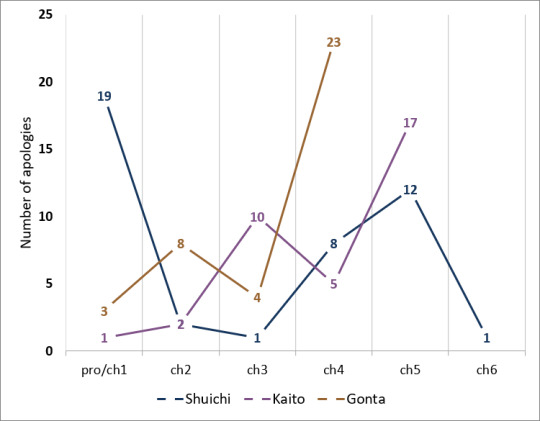
Shuichi
Despite him obviously having the most lines, I was pretty surprised that Shuichi ended up with the highest apology count overall. I wasn’t even expecting him to top Kaito’s count, let alone Gonta’s.
This conclusion did, however, seem a lot more likely once I’d made it through chapter 1 and seen just how much he apologised during that time. Geez, is that one hell of a headstart for even Gonta and Kaito to catch up to. My surprise over this was probably because, when I think about Shuichi, I usually think about the post-Kaede protagonist-Shuichi (perhaps especially because I usually think about him in a Kaito-centric context, whoops). So it’s easy to forget just how incredibly insecure – and also apologetic – he was in the very beginning.
Shuichi apologises exactly as horribly much as Kaede during chapter 1. Again, this is partly politeness, but also far too much of him having an inclination to feel bad over things that aren’t his fault because of how insecure he is. Kaede and Shuichi basically spend most of chapter 1 constantly apologising to each other for existing, and it’s heartbreaking. Every time I had to add another of theirs to my spreadsheet, I was all, “No! Stop it!”
What I find really fascinating about Shuichi’s count, though, is that he pretty much loses this bad habit entirely after Kaede’s death. Despite him still kind of moping around and struggling to know what to do until Kaito steps in to help, it seems like Shuichi’s resolve to carry on Kaede’s wish and believe in himself more really had already had a tangible positive effect on his confidence!
This also means that Kaito never has any reason to give Shuichi advice telling him not to apologise if he hasn’t done anything wrong, which he absolutely would have done if he’d spent more time with Shuichi in chapter 1 when he was apologising so much. As I mentioned in my original post about this topic, this fact is important.
Shuichi’s counts in chapters 2 and 3 are especially low. This is what background noise politeness from a character tends to look like – and it also pretty clearly proves that his and Kaede’s huge apology counts in chapter 1 are down to way more than them just being generally polite people who are getting the most screentime.
It might look like Shuichi gradually gets more insecure again as the killing game goes on, but that’s not actually quite why his count goes up again like that. Instead, it’s that, when something particular does go wrong, Shuichi still feels inclined to apologise for it a lot more than most people would. Turns out, most of his excess apologies in chapters 4 and 5 are spurred by very specific incidents involving Kaito.
Literally five of Shuichi’s apologies in chapter 4 are over the cell phone incident with Kaito during the investigation. That genuinely did warrant an apology – he should have thought to warn Kaito that he’d be logged out beforehand so he wouldn’t be so startled – but even then, apologising that many times was still rather excessive. Shuichi evidently felt really bad about startling his friend like that in the first place. But it also doesn’t help that Kaito reacted more strongly to it than he should have done, for reasons rooted in his own issues that Shuichi was completely oblivious to, which is probably a lot of why Shuichi felt he had to keep apologising.
Three of Shuichi’s apologies in chapter 5 are over the awkward situation between him and Kaito, albeit directed at Maki and not Kaito. This is despite Shuichi himself asserting that he doesn’t believe he should apologise for his actions in trial 4. Even then, he’s still feeling insecure enough about the whole thing that some unintentional apologies slip out of him anyway, not precisely about Gonta’s trial, but about not being able to fix the rift between him and Kaito. He seems to feel like that’s meant to be his responsibility, when he should be able to realise himself that it isn’t. The real responsibility to fix this is on Kaito. Once again, it’s Kaito’s issues – and Kaito not talking about his issues – that causes Shuichi to apologise for something more than he ought to.
Another three of Shuichi’s apologies in chapter 5 are over lying to his friends at the end of the trial in a desperate attempt to protect Kaito. (…Well, technically all of these apologies are part of the lie and therefore not really him apologising for lying – but his inner monologue confirms that he really is sorry for lying, which is almost certainly why he ends up fake-apologising so much within the lie. More on this principle in a bit when I talk about all of Kaito’s apologies in trial 5.) Again, this is another thing that does genuinely warrant an apology, but probably not three times? And while this one isn’t related to Kaito’s issues, it is still because of Kaito that Shuichi needed to try and lie to everyone in the first place.
(One more of Shuichi’s apologies at the end of chapter 5 is for Kaito’s death, because in his grief he’s hurting enough to have slipped back into feeling like everything is his fault. At least this is just the one, and Maki manages to talk him out of blaming himself any more than that.)
Without these specific incidents that he’s still a bit too inclined to feel bad about, Shuichi’s count would be three in chapter 4 and five in chapter 5. So, basically just background noise politeness again. Maybe he’s being slightly more generally insecure in chapter 5 than usual, perhaps due to Kaito not quite being there for him, and/or the whole despair thing. But he’s no longer constantly apologising for existing to nearly as much of an extent as he was in chapter 1.
Delightfully, in chapter 6, with Kaito’s death spurring Shuichi’s determination into overdrive, Shuichi’s count goes right back down to insignificant background noise politeness. Nothing at all happens to make him feel like he needs to apologise way too much.
This is exactly how I hoped it would end! He is being a hero and none of his actions here are anything for him to make himself feel bad about. Kaito would be proud.
Gonta
Gonta’s background-noise politeness in the earlier chapters is noticeably higher than everyone else’s, because there’s also quite a bit of insecurity and apologising-for-existing going on with him. But it’s still not, like, super high on its own. It might not even be quite as bad as Kaede, even accounting for him getting way fewer lines than her?
His somewhat higher count in chapter 2 could be because of the Insect Meet and Greet, but it could also be because the way Ryoma’s body was discovered made Gonta feel especially strongly that he should have been able to prevent Ryoma’s death.
But then, of course, there’s chapter 4. As you’d imagine, almost all of those are in the trial, and almost all towards the end of it. Poor Gonta. It also doesn’t help that there’s two Gontas in the room for the trial conclusion, and naturally I included Alter Ego Gonta’s apologies in Gonta’s count, too.
Kaito
For the first two chapters, when he doesn’t have any sidekicks and therefore no expectations to live up to as their hero, and/or when he’s not struggling with weakness and worrying that he’s failing those expectations, Kaito’s apology level is just unremarkable background noise like most other characters.
(Well, one of them is actually not background noise and is a meaningful, warranted apology for punching Shuichi at the end of trial 1. But because he correctly doesn’t apologise for this any more than he needs to, it kinda blends in with the background noise.)
Then chapter 3 happens, and, predictably, his count shoots way up. All but one of Kaito’s apologies in this chapter are over being sick due to his phobia. (And if I’d been counting the free time invitation dialogues, there would be another four added on here, again for being too sick to hang out with Shuichi.)
Of his five in chapter 4, one is genuinely warranted (for laughing at Maki’s katana story), and two are over being physically sick, goddammit, Kaito. The other two in this chapter are for letting Kokichi’s taunts get to him, which is also not quite a thing he should be apologising for. Kaito can’t help it if his emotions react in a certain way to Kokichi making him out to be worthless. He can control how he responds to it, but not how he feels over it.
Then there’s chapter 5, which somehow manages to even eclipse Kaito’s chapter 3 count – but most of this is about the trial. Only three of his apologies in this chapter are from the Daily Life. (Naturally, two of them are still over being sick. No, Kaito, stop it.)
Literally half of Kaito’s fourteen apologies in the trial boil down to being sorry for tricking and deceiving his friends. This is something that warrants an apology, according to Kaito’s principles, even though he’s doing this deliberately for the purpose of hopefully saving everyone. He is still choosing to hurt them as part of that, and that hurt deserves to be apologised for.
What’s interesting about most of Kaito’s apologies for this, though, is that they’re technically insincere. He’s apologising for tricking everybody while he’s still tricking them, which sure makes it sound like he doesn’t mean it. This even applies to the majority of these apologies that happen during the bits where he’s speaking in his own voice. Because “Exisal Kaito” is a fake and overexaggerated version of himself that he wants everyone to conclude was really just Kokichi pretending to be him, anything he says during those moments is never going to come across as genuine.
But obviously, there’s not a shred of doubt that Kaito really is sorry for tricking everyone the entire time he’s doing this. It says a lot that during those bits where he’s being himself, Kaito just so happens to have a particularly high density of apologies-per-line. He feels awful for being this insincere and deceptive towards his friends, and he really wishes he could just communicate to them how genuinely sorry he is for all of this. But because he can’t, the next best thing to try and scratch that itch is to just apologise anyway even though he needs them to assume it’s all fake.
Kaito even apologises a couple of times as Exisal Kokichi for lying to them! This is absolutely categorically not something Kokichi wrote into his script, because Kokichi never apologised for lying, not even in a blatantly-insincere-sounding way. Kaito’s desperate desire to express how awful he felt about this was just so strong that it even accidentally slipped into a couple of his ad-libs as Kokichi.
However, while Kaito apologises so many times for this, it’s not because he’s blaming himself a bit too excessively much for his wrongdoing like Shuichi was still liable to do at this point in the story. The only reason Kaito apologises this much for tricking everyone is due to how insincere he was forced to sound almost every time. He kept apologising again and again because each insincere apology never felt like enough, and he desperately needed them to know that he meant it.
When Kaito reveals himself at the end of the trial, he pretty much immediately apologises again for tricking them – once, and that’s it. This time, they know he means it, and that’s all he needs. He’s not going to wallow in his bad feelings any more than that.
This is also the case for the other genuine wrongdoings he goes on to apologise for in the conclusion. Kaito gives a double-sized but still concise apology to Shuichi for lashing out in trial 4 like he’d needed to give this whole time, and then one single apology to his friends for lying to them about his illness. He gets those apologies out like he should, but once he’s done so, he doesn’t linger on them and mope any more than he needs to.
Which is good! Look at Kaito finally following his own advice again and being emotionally healthy about this!
…Except for the part where he then goes on to apologise twice for dying on them. That one is still not his fault.
#danganronpa v3#danganronpa v3 spoilers#ramble#kaito momota#shuichi saihara#gonta gokuhara#kaede akamatsu#kaito's hero issues#i may be just a little bit bitter about this ridiculous myth#i am also fully aware that i'm preaching to the choir here in terms of people who read my blog#but shush let me geek out about this data anyway
177 notes
·
View notes
Note
Qrow
Tell me about how you feel about Qrow for the character meme
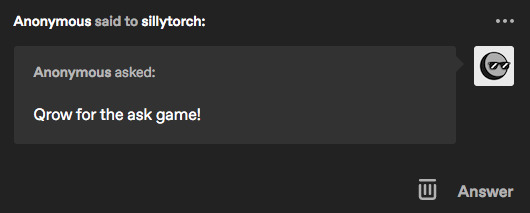
Two asks for Qrow! Alrighty!
favorite thing about them: I really like how the show plays off of his Rugged Drunken Mentor figure character archetype. In a lot of anime (and any media in general), that kind of archetype is always romanticized and it's kinda a bad thing b/c alcohol addiction is serious. And we see what alcohol addiction does to someone like Qrow, aka someone who is a broken man b/c of how awful his life is. We even see him trying to move away from his alcohol addiction. On top of that, I love that despite all of that, he tries to be a good person and a loving uncle to his nieces. You'd think with the life he has it's a wonder that he's not a villain, but he is such a big sweetheart who not only trains w/ his nieces but even plays video games w/ them as well and it's just UGHH!! So sweet!! >w<
least favorite thing about them: Uhh... I kinda wish we got him interacting more with other characters? Like I wish we saw him interact more w/ Yang, Ironwood, or... even Robyn? I know it sounds weird to say about Robyn since they were partnered up in V8 but they should have had more interactions, and I think she'd be a really cool sis figure for him too :3
favorite line: "Look, just remember that you've still got a long way to go. And don't think for a second that graduating means you're done. Every day out there is worth a week in this place. You two... you're gonna go far, but only if you keep learning, if you never stop moving forward." (RWBY V3 Ch 4: Lessons Learned)
brOTP: Qrow/Robyn; like I said, I really wish we got more interactions between them. I think w/ their bird motifs and their personalities, I'd see a really cool sibling-esque dynamic going on.
OTP: I do have a soft spot for Magpie (Qrow/Roman) cuz I just think it'd be fun and that they both have some similarities going on too :3 (esp now after reading Roman Holiday)
nOTP: Snowbird (Qrow/Winter)... like even w/o the big age gap between them, I don't want them together considering their interactions and fight in V3 and also knowing that Willow is an alcoholic and her addiction really had a huge effect on her kids, it just makes me not wanna ship them together >_<
random headcanon: He used Tai and Summer's heads as a little perch spot at one point when in bird form.
unpopular opinion: This man's never gonna die. Yeah yeah he's the mentor archetype and those types of characters end up dying, yadda yadda. But look, considering that so many horrible things has happened to him so far in the story and the fact that he's also fighting a really bad alcohol addiction on top of that? Ending his story by just killing him is just gonna be cruel. This guy deserves a break that doesn't end with his life getting taken away. Not to mention, Ruby's kinda already shown many times she doesn't need him to tag along and we literally have a volume coming up where she's just gonna be w/ her team (and Jaune + Neo) so like I think it's already clear that they've moved on from Qrow being just her mentor figure. ... also the "QROW'S GONNA DIE!!!" thing has been going on since V4 and it's getting pretty annoying so shut up, shut up!
song i associate with them: Bad Luck Charm (RWBY Soundtrack-wise); Silhouette (Owl City); End of the Earth (Marina)
favorite picture of them:
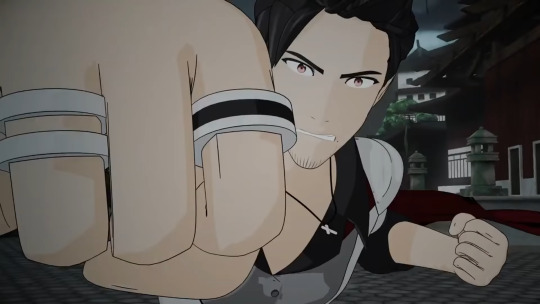
Qrow Branwen is going to punch you :)
7 notes
·
View notes
Text
Okay so This is just a way to let out some frustration so I can put it out there and stop mulling on it bc I'm bad at this sort of stuff - Feel free to ignore it
I'm putting this under Read More; if your fav past-time is to call anyone who likes Ironwood's character or was disappointed by his V8 turn to villainy a stupid bootlicker who "should have seen the signs he was always a tyrant !!" please don't interact with this post. You're ultimately free to think what you want but honestly I see enough of that in the main tag when left alone, I don't need it on my blog it doesn't make me feel good.
Anyone else... well you can read if you're interested but you don't have to either. Feel free to respectfully disagree though, I'm not that bullheaded that I can't partake in a friendly argument =) I'll just be listing some things about Ironwood's reading by the FNDM who get old or draining as someone who doesn't like the V8-characterization they went with
Can people please stop just... copy/pasting real world issues on a world/characters that have nothing to do with them or a completely different context ?
Like,, I genuinely try to educate myself on real-world issues. I know I'm rather privileged so I try to listen and hear out people who speak out about the issues they live through day by day. I know why the "ACAB" moniker exists. I understand the problem that lies within the american police system (and likely other countries as well). I see why the army, on our blue planet, is criticized & its many failings. Etc, the list can go on...
But I'm sorry to say, Remnant isn't OUR Earth. Their Army's primary job is to fight actual evil soulless monsters, not people. The Ace Opps or Huntsmen are not an organization directly inherited from slave-hunting groups. James Ironwood isn't the US army general bombing Middle East. Clover Ebi isn't the racist cop you want in prison. So WHY are they treated as such by so many people ? Stories are not a 1-1 where you can take everything you know and just apply it to a completely different world.
Has Atlas been presented as a country that suffers from racism & classism ? Certainly. Has it be shown this way ? That's already more debatable since the only racist arguments we got were in Mantle (which is the city we're supposed to be rooting for so that's a weird choice but eh it's whatever). Are the characters, as persons, shown to evoke these issues in a way that deserve our scorn ? Not really.
Is Ironwood depicted as particularly racist for example ? I wouldn't say so seeing as one (or more considering Tortuga) of his Ace-Opps are Faunus & it seems perfectly accepted; and he hates Jacques Schnee's guts. So why does he get to shoulder all of our real-world issues as if he was responsible for them, in a context where (pre V8) his army had most likely never killed anything else than Grimm and was shown to elicit very positive reactions from most of the population (V3) ? (In direct contrast to the polarization that the US army might evoke for example.)
You can totally hate Ironwood because of the feelings he evoke, the trope he stems from or the parallels to be made. That doesn't mean however, that he IS truly guilty of every one of OUR world issues (pre-V8)
Just because classism is prevalent in Atlas society does not make Ironwood the figurehead & leader of this issue.
Is classism an issue in Atlas ? Yes. That's been made clear because of Mantle's state as well as Jacques Schnee entire existence & even Cinder's backstory. Does that mean every single one of Ironwood's decisions reeks of classism ? NO
Trust me, as someone who found Ironwood's V8 characterization not... well-executed & too much; there's nothing more annoying than being assaulted by posts about his fall going "it was so obvious !! look at -" only for them to then list reasons in a really biased way or even headcannons based on (again) irl problems. An exemple...
Reasons his turn was good that I see thrown around : "Ironwood left Mantle behind because he only wanted to save the rich. He's a selfish coward & an asshole !"
What we were actually given : "Ironwood suffers from PTSD, and faced with Salem's imminent arrival, he tried to save what he was CERTAIN to be able to protect aka the flying city and all the people on it including Mantle evacuees. There is absolutely no text backing the idea that he wanted to leave with Atlas because it's rich. We could even suppose that he would have left with the 'poor' Mantle if it was the flying city and rich people were hanging safely on the ground. There is indeed an issue with Atlas & Mantle disparity, but Ironwood isn't directly responsible for it."
Does that make his decision to leave Mantle behind a morally right one ? That's of course NOT what I'm saying. The situation is still very ambiguous. But the classism theme has NO place here.
"Ironwood leads Atlas & Mantle. As such, he inherently holds responsability for the issues plaguing it." THIS is an acceptable reading according to me. I would probably argue that even if Ironwood's the only Atlas leader we're shown; he actually only oversees the military & academy (where we haven't ever seen classism issues), so putting Atlas' classism issues on him still doesn't sound fair to me. However the idea & argument is sound.
Acknowledging only how his actions look/the tyrannical surface reading and not the reasonnable justifications or glimpses we were given (pre-V7) of Ironwood being more than his trope
I'll probably stop after this one, but the last thing that is both tiring & annoying after too much of it; is seeing people boil down all of Ironwood's character to the most basic summary, inherently written to paint him in a bad line. And then saying that everything led up to his downfall by using these watered-down versions of the show's events to justify it. Or worse (imo), saying that people who are not satisfied with his V8 characterization that THEY don't understand how good a character he is and don't really appreciate him.... All the while only ever highlighting his characters flaws. Please stop this.
"Ironwood brought an army to the peace Olympics why are you surprised he turned out this way ?" ==> Ironwood brought an army to a country where the civilians visibly have no issue with said-army, to protect a peaceful event that he KNOWS to be targeted by foes. It's definitely overzealous & his conviction that threats should be dealt with by blunt force IS one of his flaws; but pretending that he did it for fun or because he's a tyran is just as misplaced.
"Ironwood said he'd shoot Qrow if he were one of his men why are you surprised he shot Oscar ?" ==> Do I really need to flip through every joke in this show and consider it as absolute truth & proof that the character would enact these words if given the occasion; even when we're shown with certainty that they actually don't mean it ? (IW hugging Qrow to welcome him, refusing to attack Qrow when he's certain Qrow IS attacking him...)
"Ironwood has his military all over Mantle, there's a curfew, all of this is tyrannical why are you surprised he's also down for genocide" ==> Damn, it sure is criminal to have Mantle defended from the litteral monsters roaming inside & out, and to make sure with a curfew that the people are not at risk during the night. I wonder if any recent events could make us reconsider our stance on how evil a enforced curfew is. Mhmmm maybe a pandemic ? Nah I must be imagining things. For real though, at what point did Tyrian's framing/lies (IW has his soldiers all over Mantle because of politics/he's a tyran who refuses opposition) became the truth of the situation for the FDNM too ? Again Mantle's situations SUCK, and that's a problem in itself. Making up problematic reasoning for the situation is dishonest though.
To end this, I'll just make clear. I do not condone any of Ironwood's actions post-V7. I don't think he had to be the big hero of the Atlas arc. Nor that he was without faults. I merely think that he'd have been a better antagonist than villain. And that it'd have been nice to keep the ambiguity/morally greyness that surrounds him; the knowledge that he's TRYING hard to do what's best for everyone; that he has good intentions. That he cares about individuals too to a lesser degree, and that he had people who cared about him as a person.
For short... Ironwood as an antagonist with understandable issues, flaws & failures; making questionable choices but with good intentions ? Hell yeah. Ironwood as a villain, more irredeemable than Hazel, willing to kill people for NO reason or even wipe out a city ? I'm not convinced.
22 notes
·
View notes
Text
super anti-komahina salt
and this is to go further beyond
I saw a komahina fan post a write-up and it just irritates me so I want to break it down:
“If you think Komaeda is batshit insane or that his character is only about his obsession with hope and you interpreted Hinata's feelings about Komaeda as just hate of course it wouldn't make sense. Except neither of these are true for their characters.”
This is the basic surface-level narrative Komahina fans argue against, and fair enough, it’s a massive generalisation. But this argument also just irritates me because it implies everyone who doesn’t ship them do so because they don’t understand the characters well enough.
“long story short Komaeda's obsesses over hope as a coping mechanism, because it's the only thing he can cling to.”
I can agree with this in a way, but in my opinion I don’t think he’s so weak that it’s impossible for him break free from that mindset (during the game) if he really wants to.
“Komaeda doesn't like Hinata because he thinks he is talented and above him, Komaeda says he loves all ultimates but it's not real love. His love for Hinata is different. In the SDR2 drama CD he mentions that he loves Hinata because he tries to understand him.”
I can agree with this. Although the Drama CD is literally just the Free Time Events, I don’t think it’s some kind of ‘gotcha’ like people think it’d be.
But also keep in mind, yes, Hajime tries to give Nagito a chance and doesn’t immediately run away screaming because scary person he can’t understand, but Hajime also doesn’t particularly act more saintly than all the other kids towards Nagito after Chapter 1. Nekomaru and Kazuichi seem to at least try to hear Nagito out before they punch him in the face. Mahiru seems like she was the first one to consider giving him breakfast. Hajime tries to stop Akane from attacking him after the Chapter 1 trial, but mostly because he’s resigned to the fact it won’t change what he did, and he then changes his mind and gets pissed off when Nagito decides to taunt him about his amnesia in response. And it’s Sonia who finally settles everyone down. So yes, Hajime tries to understand Nagito, but in the actual plot itself that’s not a special trait unique to him.
It’s only ‘unique’ if you choose to do the Free Time Events, and the Free Time Events...are basically not canon. They’re more like a what-if scenario the player chooses to view, and the dialogue was written from that perspective.
As in, maybe it’s canon that they’d interact like that if they spent time together on the island, but it’s not canon that Hajime does and wants to do that during the story. Because you can do them for everyone.
“And they reach a mutual understanding in DR3 because the two of them are more alike than Hinata would like to admit.”
Um...
Well, this is why DR2.5 is bullshit
I agree they’re similar, but I think both of them knew this from the very beginning. It’s not exactly a reason for reconciliation and forgiveness. The fact they have similarities is the exact reason why Hajime is so upset at his betrayal, and snaps back at Nagito every time he brings that up. So I don’t know if that’s really a good reason to explain why they’ve forgiven each other come DR3.
“Komaeda doesn't see himself as above untalented reserves either, because in 2-4, after realizing the truth about Hinata he says that they are the same, stepladders for hope. He was lashing out at all the students for being despair. They are similar, because they both share the same views that talent is everything.”
And then Hajime gets his character development for the rest of the game all so he can realise talent isn’t everything. So...?
“Now from Hinata's end, a lot of people seem to miss this about him, but he is someone who denies his feelings when they get inconvenient, he is called a tsundere by monokuma”
I guess this is a diss against the surface-level people and people who are like “but the text literally says this”. But even then, the game literally shows Hajime’s inner thoughts. If he’s conflicted about things, the text generally shows that too, even if it’s with a careful inclusion of a ‘...’
So I don’t think we should take that trait as an excuse to literally ignore what the text says.
He was felt pumped when Komaeda was out of critical condition, but he thinks "why do I have to feel pumped, oh well best not to think about it"....because Hinata likes to avoid facing things that inconvenient him. Hinata finds it hard to trust Komaeda and doesn't play along with him, because he is afraid of getting caught in his pace, and not because he hates him and thinks he is better off dead.
This part literally read like a high-schooler’s english essay, and maybe this kid actually is a high-schooler, tbh. Because that is one big leap from “Hajime finds it difficult to deal with his feelings” to “since Hajime finds it difficult to deal with Nagito, it means he doesn’t hate him”.
“I don't think Komaeda is a fundametally bad person but is shaped to be what he is because of his luck cycle. In his last FTE, Hinata asks what Komaeda would do if didn't have his luck cycle, and his answer was something along the lines of " a normal life, devoid of hope and despair". And we get to that his innermost desires is to live a normal life in the OVA, and his character song zansakura zanka.”
He can also just decide to not believe in his luck cycle.
Also, in the OVA, he’s embarrassed by that inner desire and tells World Destroyer he hopes no one saw that maybe he wishes for a world without talent.
Like his desire to be a good person is so hidden that he doesn’t want people to know.
“Hinata even mentions Komaeda isn't trying to trick anyone for selfish reasons in his report card, so it's a shame to see so many people attribute all of Komaeda's actions to malice just because of what Hinata thought of him in chapter 5 because it wasn't clear what Komaeda's reasons were at that point.”
Okay, a few things to unpack here:
Just because Nagito is doing things ‘for the greater good’, doesn’t mean it’s not also selfish. Hajime isn’t going to say that because Hajime doesn’t realise that. You can’t exactly trust him with being able to articulate everything about a character’s worldview. Izuru would. He probably does in Chapter 0. (And that’s why he seems disgusted by him).
Also, there’s “maybe Hajime is a slightly unreliable narrator because he tries to avoid thinking about difficult things”, and there’s “actually, the majority of how Hajime views Chapter 5 is unreliable because he didn’t know for sure if Nagito’s plan was malicious or not, it was just his gut feeling”.
What about the video message after Chapter 5? What about having to spell out ‘KILL US ALL’? What about Chapter 0 showing how in the real world Nagito had completely lost it? It’s not like the game was trying to present Nagito as any little bit more sympathetic after the trial. If anything, every piece of new info reinforced that mindset Nagito was filled with malice, up to the ‘fake Makoto’ saying that he somewhat understood him. The fake Hope made by Junko to trick them.
If you compare Chapter 5 in 2 to Chapter 5 in V3, you can see how the positioning is different. V3 does the “the villain tries to make himself look the worst he can in the mind of the heroes when in reality his real intentions were different” a lot better. More flat-out intentionally - the protagonist kind of literally giving a monologue about how the character was morally grey and even at the end there they couldn’t say they knew their true intentions. But also it’s just not as...sinister as 2-5. No ominous chanting, no dismembered limbs, none of the characters feeling completely out of their element and terrified. I think it’s text that Nagito is supposed to be villainous in Chapter 5 and even past Chapter 5.
So...
I can at least understand where Komahina comes from, but god it annoys me
Unpacking it like this, I can see it’s not even fair to argue back a lot of it - the stuff people are saying do make sense and are arguing against kinds of people I have seen.
Besides, I’m not arguing Komahina ‘can’t be canon’.
My view is just I think Hajime deserves better than a character like Nagito, who never repented for his actions on-screen or even gave much of a hint that he wanted to repent for his actions.
And that it’s still easy to argue that Nagito is a bad person even with his trauma.
Not everyone who calls Nagito an awful person is an idiot who doesn’t know how to read text past the surface, you can still make a nuanced take with that conclusion
for god’s sake
10 notes
·
View notes
Text
My Honest Opinion On Clover
[ Note: this is not me promoting hate. I just need to get this off my chest because this has been bothering me for quite some time after V8. This is also a major rambling diary entry. ]
So, just to be honest, but Qrow really should have spent time with James more than Clover.
And I'm not saying this because I think Clover and the Ace Ops are a huge waste of time, but because... well yes, I think the Ace Ops are a waste of time.
But also, after what happened in V8, what is the point of the Ace Ops even being introduced? Retroactively, V7 means nothing after V8. Everything established was for not, and even the stupid team tension was a waste of energy spent on nothing.
I have my own gripe on the new group of characters that were introduced in V7 - the Happy Huntresses are more than worthless, in my opinion - but it felt like it was just pointless.
And to be more honest, Clover was an OK character. Bland as plain bread, but filling. He was purposely created as that wedge between Qrow's development and trying to be more interactive with the story, and his thoughts. But without Qrow, Clover really has no purpose being in the story. They'd have to take him back to the writing room and figure out a new purpose, or simply ax him.
Technically yes, they axed him, but at the worse time.
In my opinion, Qrow and James should've been more than involved with each other during V7. Not spending time on some guy that happens to work for the General. Again, retroactively, it was all pointless to build all the tension between Qrow and Clover, because they just killed him anyway and gave Harriet the stress of crying over him instead.
[ Actually, why didn't they build up that relationship with Harriet? If she truly cared for him as she says in V8, then why wasn't that present in the previous volume? I'm not asking for Harriet and Clover to be in love or something, but CONVINCE us that Harriet really cared for the guy. As a role model or maybe a good friend, or let fans interpret what their relationship was. You can't just throw "boo hoo Harriet" at us and expect us - at the VERY last second - to accept it. That's mercilessly stupid. ]
I understand what they were trying to do with Clover. But, it didn't go through correctly. It was all surface-level and, AGAIN, all pointless in the end.
Qrow needs a friend that can be his beacon of hope, the newfound friendship that could spark Qrow's outlook in the world in a positive light. I have seen this type of character written before in a video game - and it was done with much more depth than looking at it on a superficial level.
That's what Clover was ultimately - superficial.
Which doesn't bring me pleasure to say, because I really do love these types of characters who are trying to help the depressed protagonist. I like what these hopeful characters can learn and also accept the flaws of the protag, and still work together to make things right, to make life easier to handle, and always have each other to lean on. But, Clover wasn't that.
This type of character that Clover was should not have been plastic positivity. To truly be the friend that Qrow needed, Clover would have to take much, MUCH more time and development to look at all the ugly parts of Qrow. Not just scars and some snippets of his drinking problem, but get into the nitty-gritty that has caused Qrow to be such a mess, to begin with. It's not a pretty experience, of course. Realizing how much darkness someone holds is sad and overwhelming for anyone, and it affects them greatly.
Clover should have been the guy that had to look at Qrow for who he was - not just shower him in all that "live, laugh, love," bullshit. And you know? You CAN have a character who greatly understands the hardships of being depressed and wants to help as much as they can, even if they will slowly reveal themselves to all the darkness that the person's been hiding. It's all a matter of having a great understanding of touchy topics like depression, having a sensitivity to problems that are in too deep, and helping Qrow be the better person he needs to be. Not just for himself, but for people around him.
What I mean by "Clover should have an understanding," I don't mean that little compliment he gave to Qrow in the truck.
I mean, he needs to also make himself vulnerable to his own problems. Giving Clover his own backstory about something that also caused him incredible pain can truly cement his understanding of why he wants to help Qrow. He could've lost a loved one tragically, but it's also not as typical as it sounds. It could be much more horrific than that, such as saying he lost his loved one to suicide or in some way that's become a reoccurring thing that haunts him (hell, make a Grimm that represents the lost loved one, it can create the vulnerability he has and it prompts Qrow to start trying to help now,) which caused him to become much more open-minded and helpful, and yet he doesn't overwhelm Qrow with being clingy or hopelessly in love, or being so plastic.
He just wants to be Qrow's friend.
Not only does Clover become a good friend, but he's the character that helps prompt Qrow to slowly start coming out of his shell and trying to be proactive more with his family and friends. Clover's influence has helped him try to be a better person, and while there are still bumps in the road for that process, he is getting there, and he eventually builds back up all that lost confidence that he once had in V3.
Clover would have served his purpose to the fullest extent when Qrow is in a better place. If I may say, this would be where Clover would have to die, but not in such a disrespectful way that the show did. It'd have to be heroic, accepting his death is something he's been thinking about for a while (a flaw he has,) and he has come to terms that he may die one day. But if he had to die, he would go out doing what was right.
If he had to sacrifice himself to save more people, then he should. He doesn't want to lose, even if he knows he won't live to see them survive. But that's been the risk he's been willing to take. And now, Qrow can accept that this is what's meant to be. One life taken to save so many more gives Qrow that deeper message of how much one person can make a grand difference.
So, Qrow can carry himself with heartache, but an ache that promotes his new change. He has days where he will be down and running low on his hope, but he knows he will get right back up and keep going.
But as it goes, Clover was incredibly bland and vanilla. He never had that depth that these hopeful characters should have. He wasn't enlightenment or wasn't the beacon that people looked to for hope. He was just there. And, I do get why people love Clover, because he does/did have the potential to be much more than plastic.
I just find it ridiculous that he happened to be good luck, and Qrow was bad luck. I don't like the idea of him "being the ideal version that Qrow wishes he was." That's not a positive thing, that just makes Qrow hate himself more than he should. He shouldn't wish he was a diet version of Captain America, he should be wanting to be a better version of himself that can do more than be bad luck.
If you MUST have Clover in the story, then I would suggest all the ideas above that I wrote out, but also, PLEASE don't make any romantic hints. If anything, love should be the last thing on Qrow's mind. The only love he should be having is for himself, and for his family that he's been ignoring for the entirety of V8. Relationships come last, everything else comes first.
But because this type of Navi (TLOZ) character takes such a long process to develop and get everybody on board with, they had to make Clover incredibly bland, and only make him interesting if Qrow was attached to his hip. That's not fair to either man.
And what I mean by James and Qrow being more involved with each other, I mean they had the build-up to do so. But the show was dumb enough to misfire and make their relationship worthless in the end.
James is in a weird place where he is constantly bottling himself up, only showing what he thinks others need to see: a direct and authoritative man. He refuses to be vulnerable. Qrow is almost twinning this behaviour, except he is simply refusing to show anything of himself. In a perfect world, these two can help each other come out of their shell.
Qrow knows James, despite that people say about him. He knows James is at the end of his rope with all the responsibilities piled onto him, and he knows James has been terribly alone. That hug signifies how grateful he is to have Qrow back in his life, and Qrow silently accepted that he was wanted. This was the perfect setup for both men to have that healing they both needed.
It won't be perfect, as we all know how messy both men are. But that's why it's worth the risk, to have both men face their fears together and stop hiding from what will burn them. Even if it's ugly to look at, their flaws are theirs that they have to take accountability for, not just constantly sweep them under the rug. In no way did the show give both men the opportunity to finally bond and be each others' friend. The show just decided we were dumb enough to forget all that.
And that's my stupid rambling.
12 notes
·
View notes
Text
laughable/lachrymose
Danganronpa V3 | Kokichi/Shuichi | Rated T
Toast is easy to make, right? Easy to make. You put the bread in the toaster and you wait and you spread honey on it when it’s done. Shuichi likes toast with honey. It’s easy. Kokichi needs easy. He can do this.
Ignoring the voices that have started screaming at him again he fumbles with the bag of bread, barely managing to fish a slice out, hands latching onto it in a seizing grasp so tight it almost crumbles in his hand. Flashes of hot and cold ravaging his body, he practically shoves it in the toaster, aching, hurting, shattering.
(OR: a fragmented road to recovery)
note:
drv3 spoilers!!
tw // suicidal thoughts tw // kokichi's death, miu's death, gonta's death (not directly stated but vague details) tw // unhealthy coping mechanisms
this entire thing is a bit heavy in general so please proceed with caution. it's not so shippy because my goal isn't to romanticize any of this, shuichi isn't a magical being who can heal kokichi with his words and touch, and he's also on the path of recovery as well
this was all written as a word vomit vent thing in one sitting so just lmk if you spot mistakes
i care about you, please reach out to someone when you need to
READ ON AO3!
--
He should be asleep.
Kokichi should, but then again, there are a lot of things he should be doing—healing, resting, blocking all memories out—though night terrors and bubbling trepidation and the inability to close his eyes without feeling the cold metal beneath him has proved to be a hindrance. He stays awake more often than he doesn’t, which is something entirely beyond his control; no matter the soothing words Shuichi mumbles in the dead of night, or the way he always keeps Kokichi close by in a loose yet comforting hold, he can’t sleep.
He doesn’t anymore. He’s stopped trying, anyway.
(It goes deeper beyond the label he hides behind as just insomnia. If insomnia can be defined as “persistent problems falling and/or staying asleep,” can it really be just insomnia if he’s the one who’s forcing himself to stay awake? If he only faces more sickening memories when his eyes are closed, what’s the point? Or maybe, just maybe, he’s lying to himself again, something like youdon’twantanyofthoseoptionsyouwanttodisappear—but as he always does, he lets the lie bleed into him until it is him. Until there’s nothing left to call a lie.)
He could be a zombie now, he’s sure of it. With the way he’s roaming around the apartment at—a glance at the clock—4 in the morning, and the way he certainly feels undead, calling himself a zombie doesn’t seem too far off. Shuichi’s grip on him, however loose it may have been, was getting too suffocating anyway.
He sits on the couch. Stares at a TV that’s playing nothing.
Deep breath in—
(...shut up, you asshole! the whizzing of an arrow through heavy air—kaito, can you hear me, please drink this antidote sorry, but i can’t die here… since i’m the mastermind of this killing game—redwhitehotsearingmetalcold—)
He scrambles to turn the TV on.
It’s so funny. The way they never stop fucking talking like a mixtape of voices ringing in his head even though everything is over and done with, oh god, he shouldn’t be dragging this out like he is, because none of it even happened. If none of it happened, why does he always feel the phantom pain of arrows digging into his flesh, or the descension of metal onto someone so petite—it all certainly felt so real, still feels so real—
—It’s not, and he knows that. He woke up from the simulation. Fought until there was no fight in him left. Until his lungs turned to ashes and pretty amethyst hair was yanked out of his scalp (by his doing, everything bad is always by his doing, so it seems) and so many eyes came to check in on him each day he spent recovering slowly in the hospital.
Is he supposed to feel relieved?
Happy? Glad that he’s awake from all of that? It’s alarming, really, that he feels nothing of the sort. What is he supposed to feel? Even if Saihara-chan had told him that any of his feelings were valid—anger, bitterness, resentment and horror—why does he still feel like nothing? Not numbness, but akin to it, certainly, because numbness is where you feel nothing, but simultaneously he feels like nothing. Like everything. Like death. Like life he doesn’t want breathed into him.
The TV drones on, white noise in the back of his head. He could make this work. That’s right. He’s adapted before. He can make himself feel okay again, or lie himself into thinking so, because that’s how it always ends, doesn’t it?
On shaky legs, he blocks out the voices; abhorrent Maki’s, strained Kaito’s, harsh Shuichi’s, tearful Gonta’s, desperate Miu’s, all of them cherry-picked from every single corner of his mind that he can’t ever find a way to escape anymore.
He stumbles, wandering without a purpose over to the bathroom, a trembling hand pushing open the door and flicking on the light. Headache-inducing fluorescent light flickers overhead, until it floods the capacity of the room, bearing enough light for him to be able to survey himself in the mirror.
He looks dead. Or, more so, like he could die. Right now, and maybe put an end to everything. An end to nothing. How does he fucking escape? How can he live like this? Or with this, the knowledge of everything he did in the killing game, his sacrifice, the hatred in everyone’s voices that he doubtlessly deserved?
Kokichi giggles, low and empty, as he turns the faucet on with a squeak and splashes cold water on his face. He could totally die right now. The way that brings more relief to him than anything else ever since the simulation is so laughable.
I could die. Right now. It’s as simple as using the sink or smashing my head against the bathtub. How hilarious.
Giving one final splash of frigid water onto a pale face, he turns the sink off, and allows himself a small moment of breathing. He’s been so bad at that lately, both him and Saihara. Everyone, really. No one is near being the textbook definition of okay, but they all didn’t expect to be either, although the one stark difference between them and him is that they’ve accepted that they’re going to recover slowly and reach okayness once again.
So why does he feel so stuck? Whenever he runs away from the echoing whirr of the hydraulic press it clutches him in its grasp again, and whenever he embraces it it makes him relive the entire scene over and over and over again in ways so sickening he feels like he just gets worse with each damn passing night—gasping for air even when he doesn’t sleep, awakening in cold sweat if he does manage to doze—maybe there’s nothing for him left here, fuck, why didn’t they just let him stay dead—
5, 4, 3, 2, 1. He could do the anxiety coping technique, or he could listen to music as a distraction, or he could go back to bed and pretend none of this is happening, or he could do the breathing method (in for four, hold for seven, out for eight), anything.
He could eat something. He could do that.
Shuichi’s been reprimanding him for his neglect of food anyway (even though the bluenette isn’t all that better at it) so in a way, this could serve as an apology for his inability to be a good person, boyfriend, living human being, all of that. For causing him so much trouble. For interfering with Shuichi’s own recovery process, even though it’s the last thing Kokichi wants to do. Unfortunately, the universe has a lovely addiction to just screwing him over.
Swallowing past a gag, because all of this thinking is so overwhelmingly nauseating, Kokichi stumbles out of the bathroom, not bothering to turn the light off. Everything is always so loud at night, everything is doused in so much more clarity, to the point where he can see them clearly. Miu’s face, terrified and contorted, even though it was just her avatar he still recalls so clearly the look of utter anguish on her actual corpse. Gonta’s baffled and horrified look when Kokichi wouldn’t stop yelling and yelling and yelling (“I’m sick of hearing you say you don’t know! God, why are you so dumb?”). They haunt him in ways unexplainable, although both of them had already made clear they’re on the path of forgiving him, but why does he need to be given undeserved forgiveness—
He finds himself in the kitchen, hands so shaky and cold he’s barely able to even turn on the light, panic emanating for no fucking reason, because he’s all messed up and gross and mutilated in ways that can’t be seen with the naked eye. He can’t cope. Everything fails when he tries. He laughs again, choked and nervous, opening the pantry and letting his eyes mindlessly glance over the food on the shelves; he reaches with invisibly scarred arms and takes out the glass jar of honey.
Toast is easy to make, right? Easy to make. You put the bread in the toaster and you wait and you spread honey on it when it’s done. Shuichi likes toast with honey. It’s easy. Kokichi needs easy. He can do this.
Ignoring the voices that have started screaming at him again he fumbles with the bag of bread, barely managing to fish a slice out, hands latching onto it in a seizing grasp so tight it almost crumbles in his hand. Flashes of hot and cold ravaging his body, he practically shoves it in the toaster, aching, hurting, shattering.
why are you like this it’s so easy to live why are you having so much trouble with it? is it because you can’t stop hearing iruma’s pleas or maki’s harsh words or kaito’s yells or saihara-chan’s confusion whenever you hung out and played games? is it because it would’ve been easier to stay dead, easier to be crushed and leave it at that, all cracked bones under unforgiving metal? or maybe it’s because—
Stop, fuck, just—
He’s crying—why is he crying?—by the time the toast pops out, golden and hot but he picks it up anyway, he’s been burned worse before, by words and by poison, so he holds it and puts it on a plate on the counter that they must have forgotten to put away.
With a strangled sob he clumsily takes the jar of honey again, tremulous fingers barely letting him even keep his hands on it, glass smooth and cold against calloused skin, worn and too ruined and bitten to be attached to someone as youthful as he is. He can do this, he has to do this, because he doesn’t feel like he’s getting anywhere near better but if he sticks to routine and does everyday things he should be doing easily—he could trick his mind into thinking so. It works, it always works, please work this time…
(Why is something as simple as this so goddamn hard, why is it all so hard, why was dying easier than all of this, why is existing so easy but settling down so difficult, why is waking up so simple but finding reasons to let it stay that way so unbearable, why, why why why—)
He bites his tongue and curses brokenly when the glass jar slips from his hands, falling to the floor without an ounce of grace, fracturing into uncountable glass shards at his feet.
Immediately he steps back, before sinking to his knees with a pathetic sob, the same sinful hands reaching out, hovering and unsure of what to do. Broom—yeah, the broom, he can sweep this up, he can fix it, he can fix all of this, he can fix himself, he can live, he can make himself feel okay, he can exist, he can do this, he can breathe, he can—
In for four, hold for seven, out for eight. His lungs quiver and shrivel up and cease to work whenever he tries sucking in air, body failing him, mind overrun as his vision blurs. If he could just get up and get a broom or something, he could get this all over and done with, or he could stop thinking of the worst possible ways to end this, end him.
Arms wrap around him gently before he can even try to stand up. Kokichi trembles, clawing at the hands of the person as he blubbers and cries and bows his head, unraveling again just as he always does, sick to his stomach and wondering why he’s subjected to this form of torture that he’s incapable of enduring for any longer.
The person gently turns him around in their arms, cups his cheek. The hand is cold. Shaking, too.
He wants to laugh again, but all that leaves him is another mangled cry, idly pressing his forehead against Shuichi’s chest, ringing in his ears so loud he can’t hear whatever the other boy is trying to tell him. Kokichi’s fingers dig into his back, into his soft sleeping shirt, moments away from tearing the fabric. He could throw up. He could die.
A kiss is pressed to the top of his head, and Shuichi is too nice for someone who had found his very pathetic boyfriend sobbing on the kitchen floor with forgotten toast on the counter and a shattered glass jar with honey pooling at his feet. This time, Kokichi does laugh, the noise interrupted by hiccuping sobs but near-hysterical at the exact same time, the sound oddly resembling the way he had laughed in the killing game, though lacking the malice it had at the time. Tired this time around.
He laughs until it gives way to screaming sobs, Shuichi trying his best to stop his own disturbed trembling, merely speaking softly and low into the shell of Kokichi’s ear, no doubt trying to reassure him. Or get him to cope (and fail). Or help him breathe.
why is this happening why am i like this why are you doing this to me, shuichi, it just hurts more whenever you try and i’m trying so hard to feel okay again and make things easier but it just gets harder every single day and—
—Kokichi giggles softly.
Shuichi shushes him gently, but Kokichi basks in the ridiculousness of this all. He switches between laughing and crying, screaming and chuckling, breaking down. Perhaps he’ll never get back from this. Shuichi had told him that all his emotions are valid, but how can he describe how he’s feeling into words? Crying is supposed to help. How amusing.
(Is he supposed to feel better? Relieved? He stifles a noise halfway between a sob and a chortle. It’s uproarious, he decides, that he feels anything but.)
#danganronpa#danganronpa v3#drv3#danganronpa fandom#danganronpa fic#danganronpa fanfic#saiouma#oumasai#danganronpa angst#trigger warning#triggering content#saihara shuichi#ouma kokichi#kokichi ouma#shuichi saihara
39 notes
·
View notes
Text
You had me with your words but you lost me with your action

This section will relate to the main theme of Volume 7(Trust) and how it relates to Ironwood. Basically despite all of his talk about cooperation and trust he has always been the one that has both rejected and withheld the most of these 2 concepts. Now some of this can be related to his questionable upbringing and past violent experiences. But the core idea is that for all his talk and promises he has never once kept them or bothered to see the error of his ways. As stated before his actions have done more harm than good.
He demands that his subordinates follow his orders without question because he thinks he is right and will always be right. And he never once afforded Ozpin that same loyalty, trust, or authority. Since his debut in the show, he was constantly questioning Ozpin’s choices, even though HE was the subordinate to Ozpin. Kinda hypocritical given his demand for it. He thought differently from Ozpin and could never accept Ozpin’s ways, nor listen to them. He expected the council, Ozpin, his soldiers, and the main heroes to follow him without question and he truly, honestly believes he is right. This is scary, especially when you compare him to Ozpin, but I will get to that in a moment. The big point is that people who are so sure that they are right, even if they are dead wrong, are the scariest adversaries.
What we have here is a narcissist with a superiority complex who can not accept that he is wrong. He was unbalanced since he came into the picture, and Ozpin knew it. But here is where things get interesting.
Prior to the fall of beacon Ironwood condemns Ozpin’s choices for keeping things secret and not sharing with the world everything. And, yes, Ironwood does the EXACT same thing after the fall of Beacon. The difference here is in intention. Ozpin’s purpose was to protect the people and ensure that as few people died as possible. Ozpin’s choices were not based on control or the need to be RIGHT. They were based on experience, a bit of fear, and concern for the people he needed to protect. To Ozpin, sacrifice on a great scale was never an option. He tried his best to make sure that the causalities were as limited as possible. A difficult thing to do, given that hunters and huntresses were constantly fighting Grimm and such. But creating a mythos around the Maidens and eliminating Salem from history allowed him to save many many lives. And I can guarantee that he attempted what Ironwood planned to do, at least on some levels, and met with staggering deaths.
Ironwood, however, is keeping secrets to keep control and out of fear. He needs control, and he is frustrated that people do not agree with him automatically. After the fall of Beacon, these traits became enhanced to an unbelievable level. We see something else surface, though: Ironwood’s ability to manipulate people and be charismatic. Ironwood is looking to survive: for himself( or his legacy that is Atlas). He will manipulate others and sacrifice millions of people’s lives to protect himself (legacy), though he clings to his mantra of “it’s for the greater good.” It will become the sign on the wall of the slave labor he creates. “For the Greater Good”.
Another thing you can do to really get an idea for the type of person Ironwood is, is by looking back to the round table discussions orchestrated by Ozpin versus Ironwood. Ozpin was constant in listening to his people, sometimes taking ideas from them, and allowed them to question him–even yell at him. He was patient and understood what they were trying to say. He demonstrated this with Ironwood and Qrow the most.
You would never see that kind of discussion with Ironwood. RWBY and co are new to the scene and it does throw him off. You can tell he is trying not to pressure them too much because he knows they are not on his side yet. Hooking them up with the Ace-Corps and Winter was a move to help sway them more, a subtle kind of brainwashing tactic that never worked on them as he had hoped.
“You're a good person, James. You've always done what you think is best for the people, even against strong protest. It's admirable. But it's high time you stopped talking about trust and started showing it.”
—Glynda, to Ironwood in "Mountain Glenn"
“This is the right move, Ozpin. I promise, I will keep our people safe; you have to trust me.”
—Ironwood, to Ozpin
“Many have described these as uncertain times. And while that may be the case for the rest of the world, I can tell you what is certain: the Kingdom of Atlas will remain strong... and it will remain safe. That is my promise.”
—General Ironwood, reaffirming his promise to the people of Atlas over the Atlas Broadcast System
“I will sacrifice... whatever it takes... to stop her.”
—Ironwood, declaring his conviction to Watts
How many of these promises did he actually keep and how much trust did he give?
According to Jacques, Ironwood does not trust anybody but himself, something that Ironwood does not deny; instead, he believes that his methods are justified. This leads Ironwood to a more proactive yet headstrong approach to problems, attempting more preemptive measures, as opposed to Ozpin's more subtle, reactive and analytical methods.
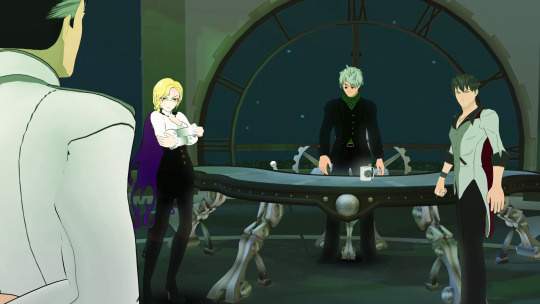
Ironwood's heroism is because of his lack of trust - he has to do everything himself, no matter what, because he doesn't trust anyone else to do it.
He doesn't trust others because he thinks of himself as the hero, that only he can do things right, that everything that goes wrong is because people didn't listen to him.
Following Orders was also another theme of this volume, but it was hinted at back in V2 and other interactions between him and his subordinates. This is a huge red flag when RWBY and co come to him in Volume 7. Ironwood has surrounded himself with Yes men, people who only follow orders and never once question them. It is a dynamic theme throughout this volume, about controlling and crushing down your emotions to follow orders–or manage your semblance? Winter started alluding to this back in V3, which really set the stage for her and future Atlas soldiers.
Because of this Ironwood is often portrayed as the least worst character while in a company of other worst characters( or other Atlasians and antagonists to be specific)
For example Volume 4 chapter 2; Remembrance; we see Ironwood and Weiss after the fall with Jaques Schnee.
This is our first proper onscreen interaction with these characters that allows us to explore their new dynamic after beacon. From a visual standpoint we can sorta see Ironwood being somewhat humble after his failure at beacon but really he hasn’t changed from the arrogant warmonger that he is from his debut.(I’ll explain that later)
During his meeting with Jaques is where we get this misdirection of his character due to the exposition from their conversation. Ironwood talks about the dust(trade) embargo being necessary as to ease tensions with the other kingdoms due to Atlas being framed is an understandable and reasonable decision in comparison to Jaques argument being that it's costing him potential Millions of world currency to profit from. The meeting ends with Ironwood leaving before making a proposal to weiss which leads to this line of dialogue with her father;
“I suppose the council trusts him, for better or worse.”
—Jacques, in "Remembrance
“I trust him.”
—Weiss Schnee, responding to her father's bad faith
Just like that the fandom is being swayed to see Ironwood in a more positive light for 3 reasons
Because best girl Weiss trusts him
Because Jaques is a greedy a**hole(As well as other Atlaisans)
Because Ironwood sides with her against the rich(V4 ep.6)

But the question that must be asked here is why does Weiss trust Ironwood?
Prior to Volume 4 she has had little to no interaction with the General. Her only point of reference for his character is only whatever Winter has told her about him, the Military propaganda and her first scene with him when he chastised and disqualified Yang and her team in Volume 3(potentially her first real and true friends by the way)
If we were to add in the factor of Ironwood's incompetence and failure at beacon, Weiss should really have no real reason to trust Ironwood who she should see as the reason why beacon fell since it was his army that he brought only to be used by the villains to kill her and her friends and destroy beacon. As well as the man who’s failure had led her back into the custody of her father.(Remember she went to Beacon to get away from his abuse) She should at least harbour some sense of Scorn or resentment for him.
The Only reason why she apparently doesn’t is because her father was in that scene. Who prior to his debut was hinted to be a greedy abusive bastard. So just like winter she sides with Ironwood simply to defy her father. The difference between her and winter though is that she doesn’t see him as a potential father figure that he may have presented himself as when he first met winter. Instead she sees him as someone she would prefer to be around instead of her father.
This is further explored during Volumes 5 & 6 where Ironwood was absent leaving her free to continue throwing shade at Jaques, Whitelty, etc. To reiterate Weiss is not pro Ironwood because she thinks he might be a good guy. She is pro Ironwood to spite and defy her abusive father.
We possibly covered what was going on in the mind of the ice queen during volume 4 that had allowed her mind(as well as us) to be swayed to favor Ironwood. Now we will cover how she ( and the audience) was wrong by relooking at Ironwoods character by the end of Volume 4( his last on scene appearance before his return in V7)
Since Ironwood was largely absent from Volumes 5 & 6 and only mentioned during those volumes we were left with our opinion of him after V4 to hold us over till his return in V7. The problem however is that we only had 3 scenes and one mention of him during the whole of volume 4. So what are those 4 moments of Ironwood that you may ask? In order they are;
His first argument with Jaques where Weiss sides with him
Taiyang telling Yang that it was him who gifted her a new arm(For whatever reason?)
Ironwood siding and defending Weiss against the rich a##holes of Atlas
His second argument with Jaques while Weiss escapes, where he reaffirms his power to the greedy bastard
This is literally the entirety of Ironwood's impact on the story during volume 4. Not much if you were to think about it. But if you did you would come to realise that all of it was a major red hearing for his character. For you see at the start of this volume we were led to believe that Ironwood had changed for the better after his failure at beacon, but in truth he didn’t.
To further explain let's look at the narrative symmetry of his arc during the volume. It starts with him arguing with Jaques and ends with an argument with the same man with both arguments ending with Ironwood on top Winning the argument. The difference between the two is how Ironwood is portrayed. The first argument as stated before tricks us into believing that Ironwood has become humble and wiser after his failure. But the second shows us the truth. Ironwood hadn’t changed at all. Instead it shows us that he is still as blunt and arrogant as he was during Volumes 2 & 3. To best explain let's look at the transcripts of the argument;
Weiss is soon creeping outside her father's study door when she hears a glass crash followed by the rising voice of James Ironwood. She crouches behind a cushioned chair against the wall.
Ironwood: You need to control yourself!
Jacques: You're talking to me about control? Do you even hear what you're saying?
Ironwood: I am basing everything on my reports from your daughter.
Jacques: A daughter you stole!
Weiss moves closer to the door to listen.
Ironwood: Oh, we are not getting into that again.
Jacques: Oh, yes, we have far more pressing matters to discuss, starting with your apparent lunacy!
Ironwood: Jacques!
The scene changes to an overhead view inside Jacques' study. He is seated at his desk while Ironwood has both hands on it, leaning over him from the other side.
Ironwood: (sighing heavily) Winter is one of my best. If she's telling me there's a threat in Mistral then I am not going to take that news lightly. She's been there for weeks, people are mobilizing, sudden spikes in weapons and Dust trades. Someone is about to make a play and I do not trust Leo to stop them.
From this first half of the scene we are only shown the middle and near end of the argument and we are left to interpret what led to this escalation of opinions. Prior to this we are swayed to believe that Ironwood is in the right while Jaques is in the wrong. But before we are shown the cause of the argument via its resolution, we get this interesting bash from Jaques claiming that Ironwood stole her from him(or to be accurate her family).
I find this interesting because we don’t exactly know why Winter would be so loyal to Ironwood to the point of saying that her life doesn’t matter in V7 and why she would be so against her family to the point that she makes no effort to see Weiss, and Whitely included and only bothering to be apart of weiss’s life only because she seems to be following the same path of defiance against their father. In other words she only chooses to interact with her sister only if she is rebelling against their father. If she is not, then WInter wants nothing to do with her.
Now who or what exactly would cause Winter to have this unhealthy mindset in regards to her own personal existence and relationships?
The answer being Ironwood.
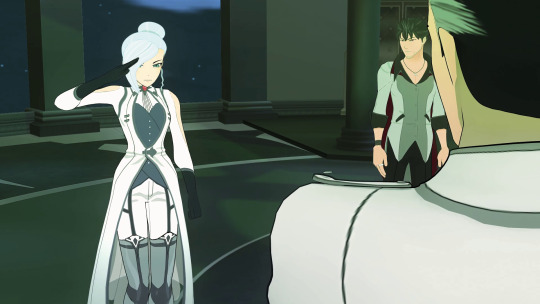
If we were to consider Jaques words being serious than it is more than likely the truth. Ironwood did steal Winter, not just from her father but from the rest of her family. I don’t know what exactly Ironwood said or did to turn winter away from her family but it wasn’t out of the kindness of his heart. He did this just to have a loyal subordinate with incredible power( her hereditary semblance) & status( her grandfather's legacy and accomplishments) just to give his power and status more legitimacy.
By doing so Ironwood had brainwashed Winter into believing that her family as well as herself is beyond redemption due to the actions of her father thus leading her to abandon them and only believing Ironwood can redeem her hence why she values her life so little and is willing to die for whatever Ironwoods says.
Now we move on to the next part of the first half where Ironwood doesn’t trust Leo to handle the situation in Mistral. He first starts this off by listing all of the things that obviously would be of concern in regards to potential riots and war. Understandable and reasonable to be ready for an attack. Especially for a paranoid military leader. But here’s the thing: this is a foreign affair that has to be resolved by the people over there. In other words, that is Leo's problem to resolve, not Ironwood’s. (Keep in mind this is Ironwood before he is told the truth about Leo.)
Lionheart who is also another member of Ozpin's inner circle like him is trusted with the safety of an entire kingdom. The difference between the 2 however is how leo seems to be a most trusted member of the group given how fondly Ozpin speaks of him to the point of giving him gifts as well as being trusted with full autonomy trust, and independence in comparison to the scorn and micromanagement Ironwood gets from Ozpin and the other members(Qrow Glynda, Theo, Etc).
In other words Ironwood should at least have some trust in Leo's abilities to handle the situation in Mistral before he learns of his betrayal. But instead he claims he doesn’t and says that he could handle the situation better. Remember this is before either we or Ironwood are shown that plot twist and betrayal. For all we know when Ironwood said that Leo may have been a decent guy. This is just simply another example of Ironwood’s ego and need for control being shown but in a subtle way that we don’t even notice
We covered the first half now we will continue with the rest of the scene.
Weiss is listening outside.
Jacques: You've never trusted anyone other than yourself!
Ironwood: (shouting) And for good reason!
Weiss covers her mouth with her hand as she gasps at the sound of Ironwood slamming his fist onto the desk.
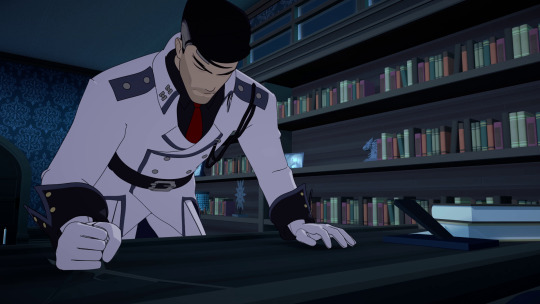
Ironwood: If Oz had just listened to me from the start...
Jacques: You need to get a grip.
Ironwood: That's exactly what I'm doing. Our people need protection. By this time next week, the Kingdom of Atlas will be officially closing its borders. No one in; no one out. Without the council's permission.
Jacques: You mean, without your permission?
Ironwood: And if that becomes the case, I would think you'd want to be on my good side.
Ironwood walks away from the desk, leaving Jacques to sigh and fold his hands.
Those first 3 lines help better clarify that despite all of the apparent good Ironwood did during the volume it exposes the truth that hasn’t changed and he is still the same narcissist authoritarian from Volumes 2 & 3. As well as a potential foreshadow of his nihilism as he ignores and rejects the fact that it was his fault beacon fell and instead chooses to continue blaming Ozpin; who if he had it his way with dealing with the events of volume 3 wouldn’t have been as disastrous as when Ironwood had his way. Simply put had Ozpin had his way continued;
Beacon possibly wouldn’t have fallen
A droid army wouldn’t have been used to frame an entire kingdom
Global communications would probably still be a thing
Fewer people would have died
Trade would still be a thing as well
The threat of another world war could have been avoided
Instead Ironwood pulled a power move against Ozpin, and it backfired immensely. Instead of learning from his mistake he chooses to blame others for his mistake and fails to realize that he is doing more harm than good.
To continue with the rest of the scene where Ironwood tells Jaques that he will be closing the borders and that nobody can leave or enter without the council's approval leads to Jaques pointing out that he really means with his permission, only for Ironwood to taunt jaques in a smug gloat to tell the greedy bastard that he has already won. The final line of that scene is probably the highlight of Ironwood’s ego being stroked as he (in his mind) has crushed and won against the last of his local opposition. It also shows us that Ironwood had amassed too much power and that it has further validated his mind into believing his own hype regardless of what the sane and reasonable characters are saying.
Now it is pretty clear Ironwood has a very toxic mindset and very manipulative personality, but why is it that after volume 4 we consider him to be a good guy till the events of V7 even though his last scene in V4 clearly shows that he is still the same as V2 & V3 Ironwood?
The reason being that his last scene was confronting Jaques Schnee who earlier had slapped his daughter in the face, revoked her inheritance, and was only presented as a corporate d##chebag. Because of this we the viewer would rather side with anyone that isn’t Jaques Schnee. But in that schnee we are tricked to side with a Paranoid Warmonger who had only a few good moments to make us believe he had changed for the better against a man who was presented as one of the most awful characters of this volume. But in truth they were both terrible when it came to morality and eventually we had to pick a side and we the audience chosen wrong(Jaques is still a villain no argument there but I think we would have no problem beating his @$$ vs getting destroyed if we challenged Ironwood on his bull$#17)
“His heart is in the right place. He's just... misguided.”
—Ozpin, about Ironwood in "Never Miss a Beat"
“Sometimes, I'm not even sure he has a heart.”
—Qrow, about Ironwood in "Never Miss a Beat"
Back in V2 and V3, Ironwood showed his ability to be both charismatic and manipulative. His subtlety in his manipulation is a statement to his rise to power. He puts himself into the position of a Father Figure to lure in the people he wants. It worked with Winter and the Ace-Ops, which is why they are his right-hand yes men. During Dance Dance, he was praising Ruby and fueling her admiration for him. Even when team RWBY came to Atlas, all his actions were calculated to manipulate the team into trusting him. Unfortunately, his actions never really lined up with his words, which was why the team was on edge.
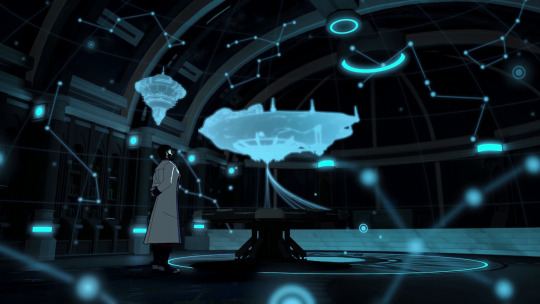
“people only did wrong when at the moment the perceived benefits seemed to outweigh the costs.”
This is exactly what ironwood did.
To Ironwood, the world cannot be saved without Atlas(or to be accurate him). He truly believes he and Atlas are the key to victory against Salem. But Victory is not in a single person, group or in strength of power. Victory is only achieved by cooperation, teamwork and in unity.
(real quick i want to give credit to @rwby-etc for they're post that I used to help better summerize this section)
I am power I am due process I will smite
#rwby#world of remnant#general ironwood#james ironwood#rwby ironwood#rwby analysis#rwby spoilers#rwby theory#jaques schnee#winter schnee#weiss schnee#qrow branwen#rwby ozpin#lie ren#rwby ruby rose#rwby atlas#rwby mantle#rwby ace ops#Ironwood analysis
59 notes
·
View notes
Text
My fav danganronpa characters with a crush (part 2)
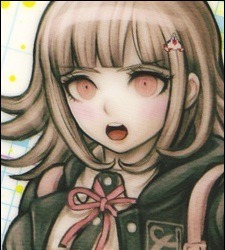
- sdr2 chapter 5 spoilers
- chiaki in my opinion can be a character at times that is hard to understand especially given romantically, even if she is a romantical interest for our protag, however ..
- I think that chiaki having a crush is full of her trying to play different games with you, more specifically games you like, and doing what she can to seem entertaining enough.
- she hates the idea of boring you honestly, she has a fear of it to be honest. She also has a fear of making you disappointed in her in any way, so she tries to be especially kind when you’re around and watching how she acts.
- she never behaved poorly of course, but she’s still more careful around you anyways..
- she tends to sleep like a lot, we know this of course. She doesn’t wanna sleep around you too much though, especially if you invite her to hang out, she’ll feel so bad and feel like she will disappoint you.
- I think chiaki is good with a crush specifically because she can deal with it in a positive way.
- will blush if you try to touch her physically as she isn’t used to the physical affection but does appreciate it quite a lot!
- often chiaki will try to be positive and always is looking for ways to make you more healthy mentally as she is always a good positive influence mentally for people!
- she gives you a big hug before her execution, she’s very sad she’ll never really get to see you again after this, but is sure to give you some advice she never got to give you. And perhaps even tell you that she loves you.
- I don’t think personality matters much for chiaki but would probably like somebody with some sort of big “issue” because she’d want to help them. (Ex; having a issue with confidence or loving yourself; having a family issue; having an issue making friends)
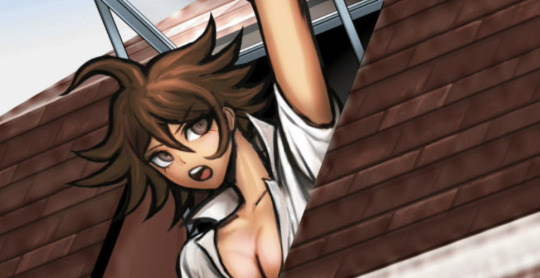
- she’s a bit harder given her lack of romantical interest, however I did decide to play dangan island (danganronpa 2 island mode) and was able to get some stuff ;)
- I believe akane will blush at any compliments or whenever you may do something she deems as kind or “soft” as it’s something she’s not very used to
- Being kind and showing actual emotions and being open and vulnerable just isn’t really like her.. given she grew up in a situation where it’s very likely she couldn’t be like that. (My reasoning for that being her free time events where she seemed to be sexually abused or manipulated)
- it takes time but akane warms up to the idea of at least being a little more soft but that’s as vulnerable as she will get. Truth be told she just doesn’t know how to be vulnerable, it’s not like she doesn’t trust you or anything..
- akane might wanna fight you a lot and claim it’s just a friendly match, just her way of showing affection it seems..
- she always thought humans needed only food until she met you.. you taught her love and companionship is just as important for humans!
- i imagine akane liking somebody who’s very energetic like herself, she needs somebody who can keep up with her dammit!
- akane thinks about you a lot and initially doesn’t understand why she’s thinking about you so much and hates it. At a point she thinks that she wants to fight you, but it doesn’t fix anything. She still thinks about you..
- she comes to find out from her other classmates she probably has a crush on you, which makes more sense to her now but still.. she kinda hates it.. having a crush... isn’t that a weakness?? She can’t go soft! Not for anyone! Not for you?!
- but alas she is very soft for you and doesn’t know how to deal with her feelings and tends to overthink it and complicate things. She’s constantly looking into the things you do.. is there a deeper meaning behind it? Do you like her too? Or see her as a friend?
- nonethless akane thinks about these things a lot and I think she will definitely confess to you soon, she isn’t the type to keep silent about things really.. plus what’s the point in beating around the bush?
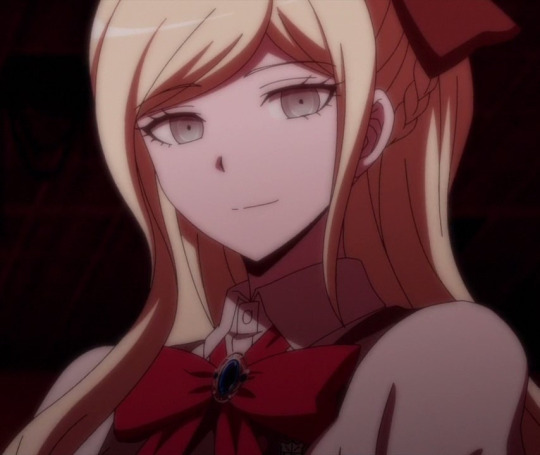
- since she does (kinda? Probably?) have a romantic interest towards gundham there’s some stuff to go off of here
- Sonia would be very quick to compliment a crush! She’s very kind in this regard I think and loves to compliment her crush a lot!
- Sonia would spend a lot of time with you, though she wouldn’t go out her way to purposely try to bond with you.
- the reason I say this is because I think for Sonia to crush on you she has to already feel a good bond/connection with you already
- it’s very likely that you’re a bit of a loner or didn’t grow up with many/any friends, she feels she can relate to you in this aspect and it makes her feel a bit better about these things.
- she blushes around you, especially if you compliment her or go as far as to hug her or something.. she boutta be so pink!
- que Souda being a jealous boy.. as he should .. you’re sexy and get to have a princess crush on you.. a ultimate princess nonetheless!
- Sonia loves talking to you about whatever creepy shit she may be into at the moment, but she loves hearing you talk about yourself as well!
- Sonia would be very trusting towards you, if you were ever a culprit during the killing game, or you were simply falsely accused she would never believe it! You are so kind and such a good friend!
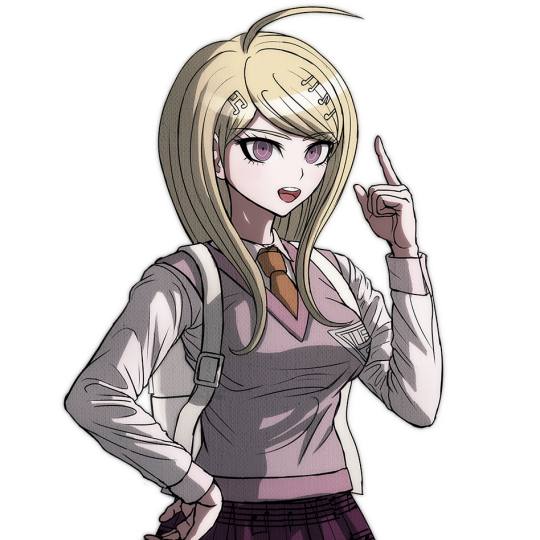
- v3 spoilers for chapter 1
- Kaede has Shuichi but even at that not really a romantic interest, however looking into her character I can get a bit of an idea what she’s like romantically if you simply analyze her character. Especially given her love suite event and such.
- kaede will definitely seek your approval for things, I wouldn’t say to the point where it’s a flaw but she definitely seeks your approval when she goes on one of her optimistic Hope speeches
- I like to think kaede is very trustful of you, even in the killing game. I think that kaede will have trouble trusting the others towards the end (which would lead to her fall), but she will always trust you!
- kaede would at least give you a hug and while crying tell you her true feelings towards you before her execution ;(
- I think kaede likes to joke around with her crush a lot because she loves seeing them smile. Kaede also always knows how to comfort her crush and always knows the right things to say and how to cheer them up. She pays close attention to them and how they react to certain people and certain jokes.
- I think kaede could like a variety of people personality wise, I could say she’d like somebody like miu, shuichi, himiko, tenko, maki, kokichi etc. she could like any kind of personality but despite how you act if you seem to show interest in her this will make her happy
- even if u act all tsundere about it what matters to her is that you’re interested!
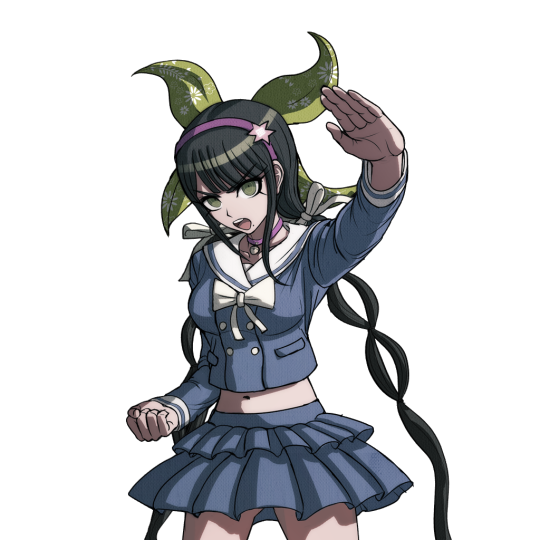
- I will try to make this one really gender neutral, I have for most of them but I won’t talk specifically about certain genders like I had with Mahiru, since there’s so much discourse within her sexuality.
- I think tenko would be interested in somebody that is a performer, I think that’s why she was so obsessed with himiko.
- she would be obsessed with you too though, always trying to be your friend and having conversations and doing her best to form a bond with you and constantly praising you, despite what your responses may be.
- tenko has a hard time concealing emotions and definitely deals with more emotions than most, crushing on you is hard for her to keep to herself for these reasons.
- which is why I think she’s pretty upfront with her emotions and will state at times that she finds you physically attractive but also finds your personality to be attractive.
- she will go as far to state anybody is lucky to date you, you could be with anyone you want.
- personality wise I do think it’s more likely for tenko to like somebody different than her own personality, somebody similar to maybe maki or himiko.
- lots of blushing from this gal, “you’re making me blush!” Can often be heard from her.
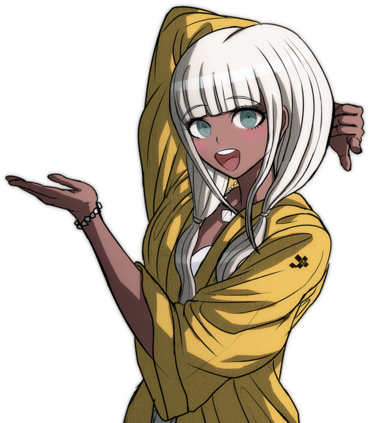
- Angie will be very open about her feelings, but this being when you get close as I think it takes a bit for Angie to like somebody.
- Angie will outright say you’re the one for her! That atua said you’re the one for her! So as such she is always calling you cute nicknames.
- Angie loves to grab your hand and drag you around to places. I also think Angie tends to act like you two are a couple already and probably claims you are ?
- quick to give hugs and such! She’s also quite clingy too and hates being separated from you at any time.. she loves being with you after all!
- she’s the ultimate artist for a reason, so she likes to make portaits of you and show them to you as well as other people.
- personality I don’t think matters much to Angie but I think she will tend to like people more shy, more nice, or in general just don’t really have a backbone.
- it makes it easier for her to have a person going along with pretty much anything she wants to do and no complaints or being that stubborn!
- likes praying with you a lot, claims she cannot pray without you now!
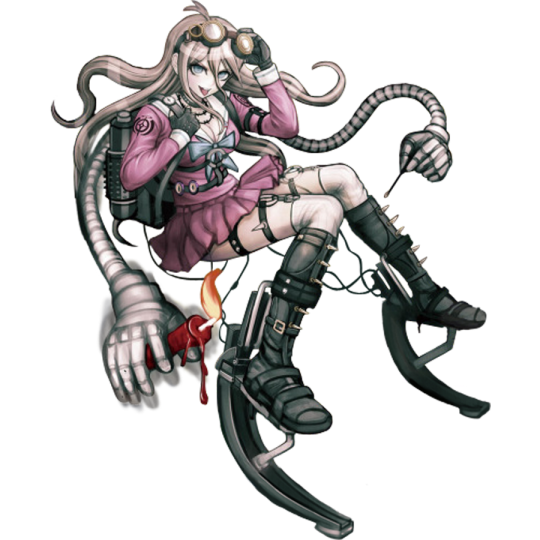
V3 spoilers for chapter 4
- I think that miu can be a bit strange towards a crush at least by her own standards. She definitely acts different towards you.
- she acts sexual and says sexual things specifically to gain your attention. Over time eventually stops doing this, but still does it from time to time.
- blushes around you, she feels nervous around you and she cannot help it.. she doesn’t fully understand why she gets so nervous though..
- it takes her awhile to understand what her feelings are, they certainly aren’t sexual.. (well maybe they are.. but it’s totally something else too)
- she will realize she cares for you a lot.. it will lead to her growing desperate to leave with you.. obviously she will give into that desperate need and it’ll be her own demise.
- miu laughs a lot around you as she cannot help but feel so happy in your presence. She wants you to feel the same so she tries to make a lot of jokes to make you laugh. She’s not always good with people and making jokes however and may come off as insensitive or mean.
- speaking of being mean, she’s usually very mean to everyone but never really to you. If she ever is she didn’t mean to be .. well mean. So she’ll try to make it up to you.
- has probably offered her body to you before. She also likes to show you her latest inventions and even invent things for you that you’d find useful. Many people find some of her inventions weird, she doesn’t care what anybody else thinks but she cares what you think so she has a fear you might find some invention weird.
- I think miu could like a variety of different people, but what matters to her is that you know how to catch her off guard. Whatever that be like kokichi with your.. attitude, or being more like kaede with your optimism and it being completely foreign to her. Catching her off guard gets her to like you. Though I do think praising her a ton totally works as well.

- you’re a lucky duck if himiko likes you! I think tenko would agree ;D
- himiko loves to smile and laugh around you, then again she wouldn’t stop smiling and laughing around you even if she wanted to.. she wants you to have fun too though! She likes making you smile by doing lots of magic!
- himiko blushes around you, you make her feel so nervous and giddy.. though she does pray with Angie when she’s feeling especially giddy because then she can avoid her feelings.
- this of course leads to kokichi knowing and teasing her relentlessly, but also genuinely telling her she shouldn’t run away from her emotions... in his own little way of course
- she likes spending time alone with you.. it’s pretty rare because of tenko which is why she likes spending alone time with you so much.. even if it makes her kinda nervous
- sometimes she feels nervous about preforming magic tricks and such in front of you.. but still manages showing off
- i imagine her liking the complete opposite of her tbh, I think she’d like somebody with lots of Rn every despite what her attitude would be to somebody like that. Maybe somebody really optimistic or somebody really in touch with their emotions.
#danganronpa x reader#sdr2 x reader#v3 x reader#danganronpa v3#danganronpa goodbye despair#himiko yumeno#angie yonaga#kaede akamatsu#miu iruma#tenko chabashira#akane owari#chiaki nanami#sonia nevermind
67 notes
·
View notes
Note
I was going through an 2009 era livejournal post where it was mentioned that most of Tony's relationship were 'sexual form of self-flagellation'. With that out I love Whitney/Tony in a relationship, is there any way you can see that working out?
Oh, man, anon. This makes me regret that I have not yet posted the story that was going to be my Cap-IM RBB last year, because I literally have a 150,000-word answer to this question in the form of fanfiction. The short answer to this question is: no.
(The longer answer: HELL NO.)
If you want me to get more complicated than that, I will say that, in all fairness, there is an era of canon in which I could have seen Whitney/Tony actually working out. But that eventually ended, and for me there's a point of no return after which any chance of this being a good, healthy, or lasting relationship becomes impossible. And since then, Whitney's grasp on reality has gradually declined to the point where I don't think that she's currently mentally capable of seeing Tony as anything other than someone who could be a personal possession of hers, a thing, an object, a prize, rather than as a living human being with his own agency. (Basically, Marvel seems to have taken a look at her and thought, "Wow, she's crazy," and it's... kept getting worse. And worse.)
Let me now provide a brief summary of the Whitney/Tony relationship, because I went and read at least fifty issues so I could write the story that none of you have read yet. Anyway. This got long enough that I think I will use a Read More.
So Whitney first appears in comics way way back in Tales of Suspense v1 #97, and continues appearing in early Iron Man v1, where she meets Tony for the first time, but also has a bunch of feelings for Jasper Sitwell. (Note to MCU fans: Sitwell is not secretly Hydra. He is a big nerd, though.)
The Whitney/Tony relationship really kicks off in Iron Man v1 #17-19, one of my personal favorite arcs, in which a LMD Tony builds attempts to become Iron Man (this is always a good plot) and Whitney kidnaps Tony because she initially thinks he's the LMD, and she's working with Midas, who wants to use the LMD to infiltrate SI. It's great.
By this point Whitney has incurred her Tragic Facial Scars and has her mask, but Tony doesn't care about the scars and, as we see in #19, is clearly interested in her anyway. He's very sweet.
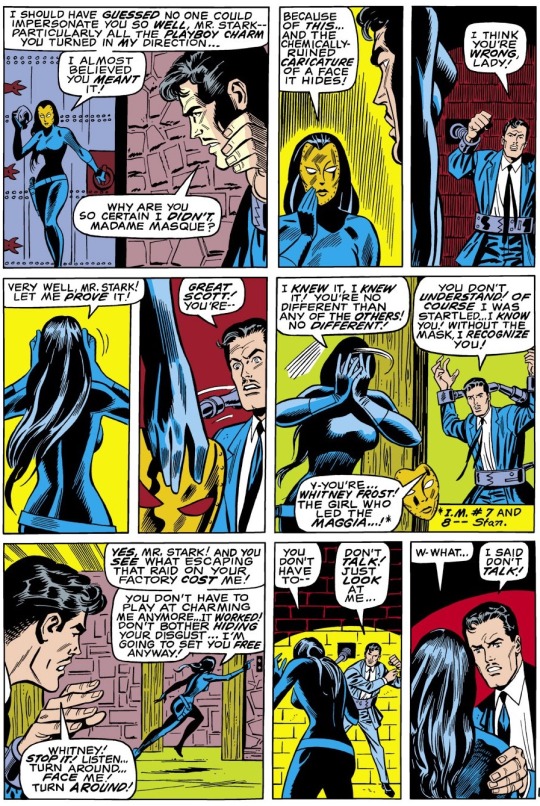
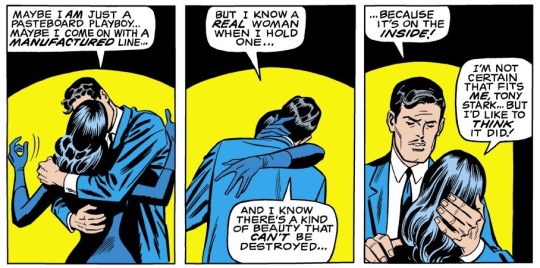
She appears a few times after that, basically leaves him for Sitwell, and then comes back in a big way in Iron Man v1 #91, posing as Krissy Longfellow, his new secretary. Whom he asks out, yes. Eventually Tony finds out who she is, and by Iron Man v1 #104 or thereabouts, they are definitely in love, Tony takes her to a house he grew up in, and also Whitney reveals that she knows that Tony is Iron Man. Which she is fine with.
Then they kiss very dramatically, and it is the most unintentionally-hilarious kiss I have ever seen, because neither of them take off their masks:

I like to yell CLANK CLANK whenever I read this.
By the next issue, #105, they are very seriously together:

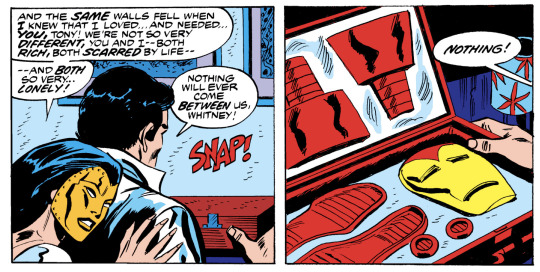
They are together for about ten more issues, and this is the era of canon where I think it honestly could have worked out for them. Sure, Tony is contemplating abandoning being Iron Man and an Avenger, so he'd have to come around on that, but this is when they were at their healthiest, generally speaking. They were in love. They were happy. They were happy right up until #116, when Count Nefaria (Whitney's father) died, and she blamed Tony for her father's death and left him:
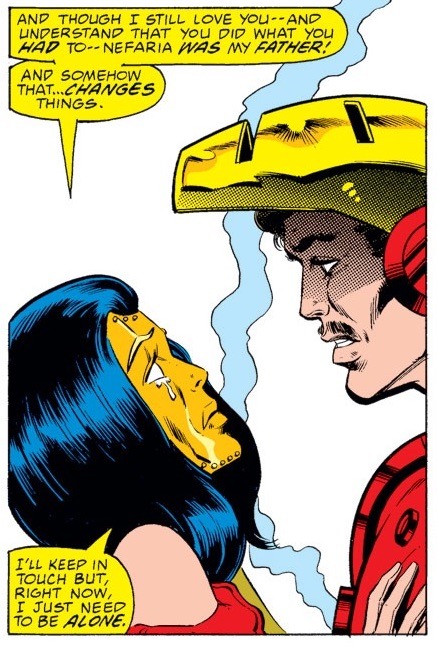
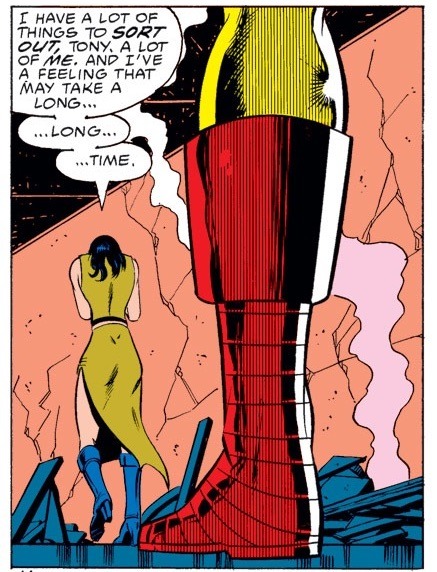
So I think that was pretty much it for their shot at having a stable, healthy relationship. Because after that Whitney basically... is evil. And I think there could be, as you say, an element of "sexual self-flagellation" in there, because Tony does still care for her as a person, although I don't see that he's necessarily interested in a romantic relationship with her again. He just wants her to be good again. He wants to help her be the good person he thinks she can be, but after this point she pretty much starts to lose her grip on reality, and I don't think she's capable of being that person.
Every subsequent appearance of Whitney in volume 1 was later retconned as being a clone (because comics gonna comics), but every time she shows up in it it's basically to seek revenge for the death of her father (who of course comes back to life, but that's comics for you) and also to get Tony back, because no one else could possibly love him as much as she does. She tries to kidnap Bethany Cabe. She works with Obadiah Stane against Tony. She tries to bodyswap herself into Bethany to get close to Tony. You get the idea. These are not the actions of a particularly stable person.
But one of the more agonizing things about Whitney -- at least, one of the things that I assume is most agonizing to Tony -- is that she could have been good. Maybe she can't be now, but at one point the capacity existed in her, and we know that because one of her clones, Masque, is in fact a very good person. Toward the end of volume 1, Masque actually ends up joining the Avengers. And I would think it's very hard for Tony to know about Masque and not think that Whitney could have been her, that there's some way he could have helped Whitney become that person, if only he'd known how, whether or not that is actually possible for him to do. (Hint: it's not.) I think he blames himself for not being able to save her. Maybe that's more of the same self-flagellation.
Meanwhile, Whitney does things like lock herself in a bunker in Nevada with a bunch of her clones, which does not strike me as a great move, sanity-wise. In The Nefaria Protocols in v3 (Avengers v3 #32-34, Thunderbolts v1 #43-44), she teams up with the Avengers to fight her father, but she's not sure whether she can trust them at first.
Avengers v3 #33 is actually really sympathetic toward her; the whole thing is narrated from her POV:


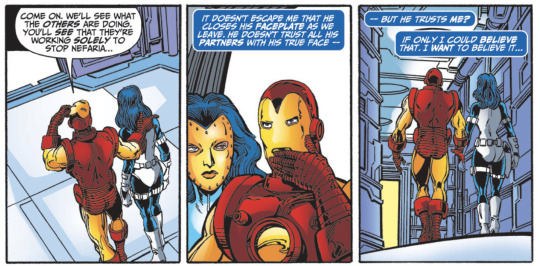
Eventually she ends up attempting to betray the Avengers and get them all killed, and she is stopped only when Masque shows up and sacrifices herself to prevent her doing so, at which point Whitney decides maybe she should save the Avengers after all before leaving. I think this is probably the nicest that canon has been to her in years, and she still nearly murders all the Avengers in the process.
After that she has a few other appearances, the most salient of which is probably World's Most Wanted (Invincible Iron Man v1 #8-19), in which, as we all know, she kidnaps Tony and is generally obsessed with him. Here in Invincible Iron Man v1 #16, Tony is in the middle of having his brain deleted and yet he still remembers that Whitney is not the best person, and she would really like to run away together with him because she apparently thinks that's a thing that's going to happen:
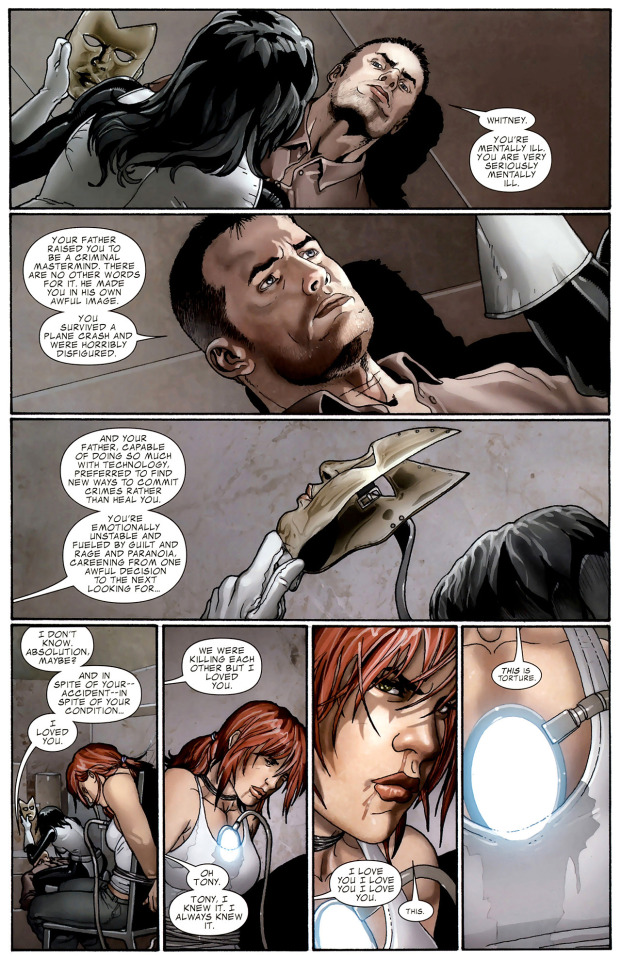
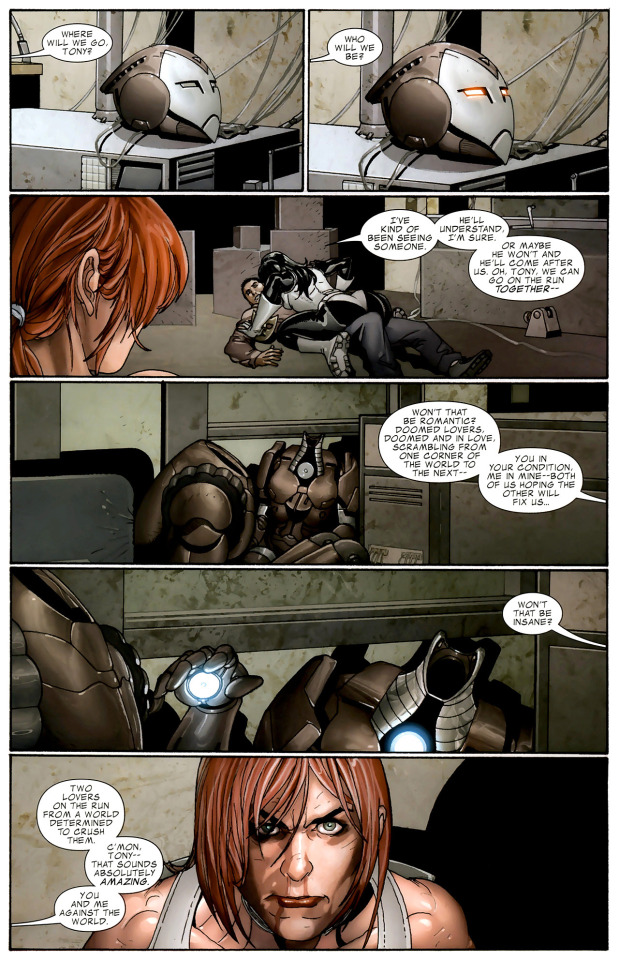
She shows up again in Bendis' run and as far as I can remember she's portrayed pretty similarly there. She's trying to steal magical artifacts. She and Tony meet up. She tries to kill him. The usual. There's a nice splash page in Invincible Iron Man v2 #2:
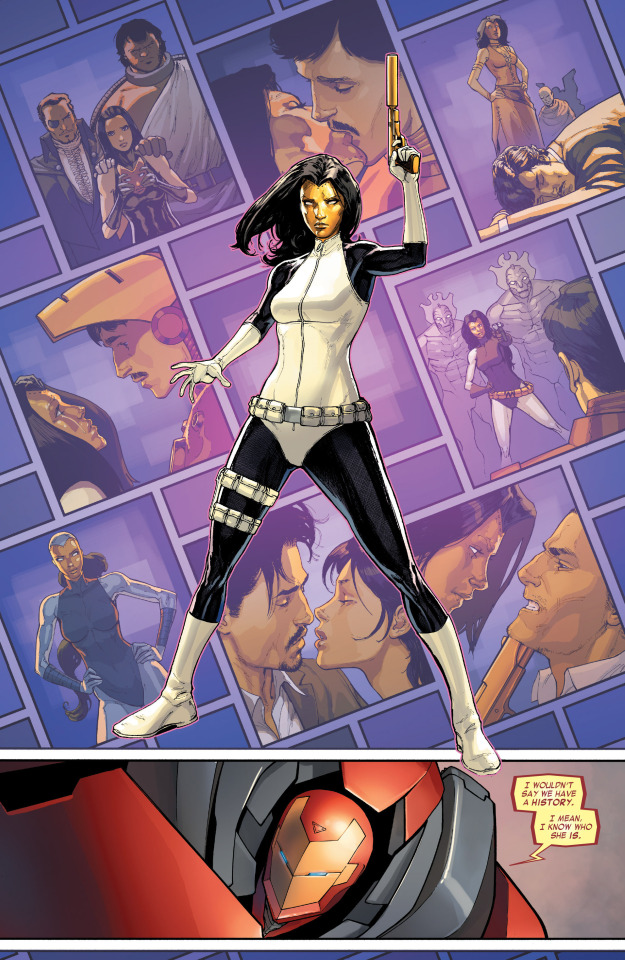
Her most recent relevant appearance is actually, if you can believe it, a few months ago, in Doctor Strange: Surgeon Supreme #5 and #6. Someone has been stealing magical weapons from Strange and selling them on the black market and -- surprise surprise -- it's Whitney.
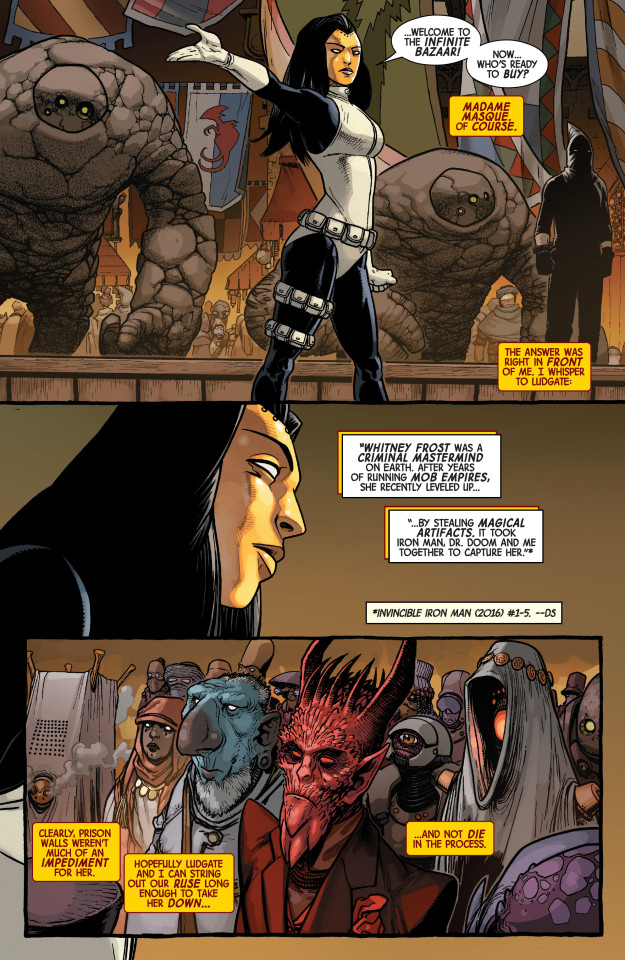
(I was actually very surprised, yes. She is, uh, not typically one of Strange's villains.)
Whitney, you see, wants to be loved:
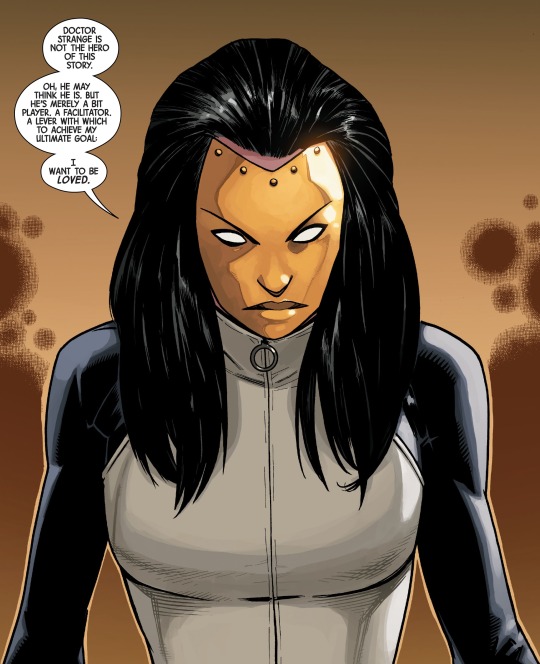
So she's selling all these weapons because, yes, she wants to be loved. By Tony.

What the hell, Whitney? How exactly is that going to work?
Anyway, Strange needs to neutralize the magical weapons, and to do that he needs to enter Whitney's mind to find the code that will do that, and, well, this is what the inside of Whitney's mind is like:
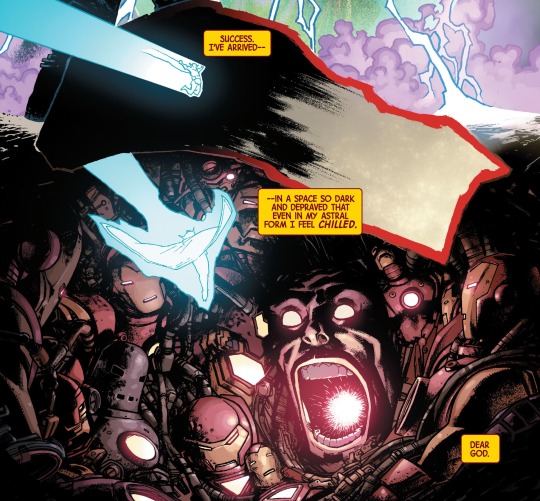
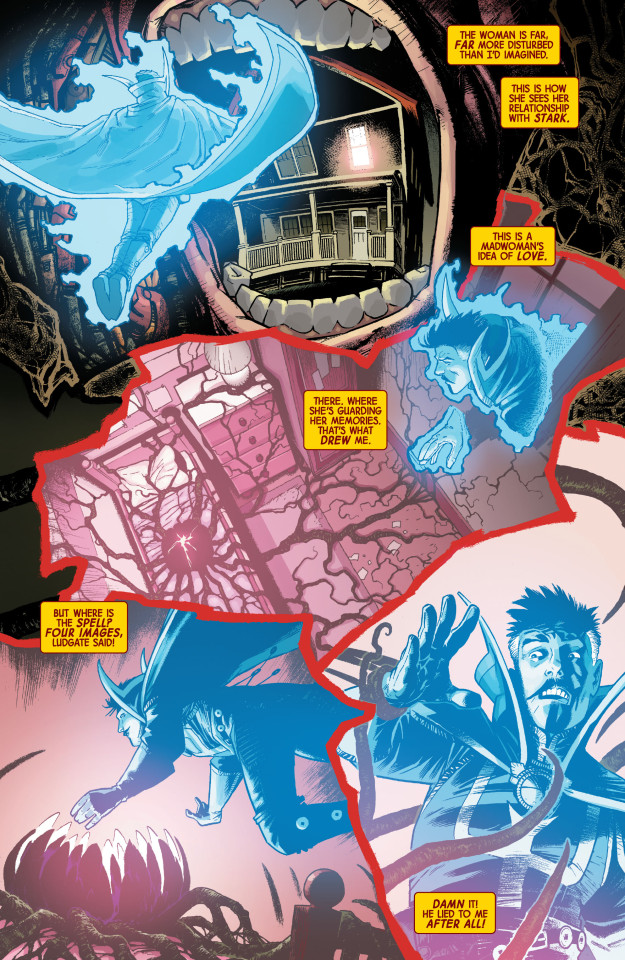
Her mind is one hundred percent made up of her obsession with Tony. This is it. This is her brain. She is a mess. She is out of touch with reality.
And you'll never guess what the code is. Or maybe you will.
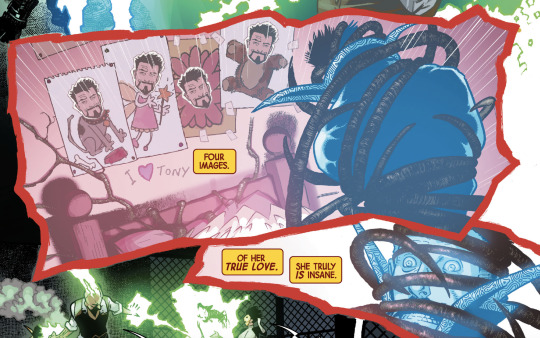
She thinks that she's in love with Tony. And she thinks that this is what love is. And she is very clearly not okay.
Because Strange is a doctor and is determined to try to help people, he offers her a new mask that will heal her:
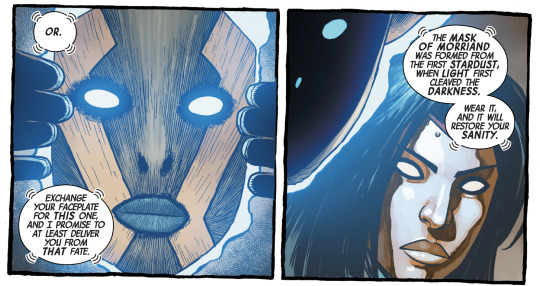
Whitney declines:

She runs away. And that's the last we have seen of her.
So, yeah. Based on all of this, I am of the opinion that Whitney/Tony cannot possibly work out at this point in canon, because -- although she still believes she loves him -- she is very obviously no longer mentally capable of understanding what love actually is, and she's not looking to change that. We have literally seen inside her mind, so we can in fact know what she thinks. She just wants to possess Tony. And that's not going to be good for anyone.
Would she have been better than this if she'd stayed with Tony instead of leaving him when her father died? Maybe. We can't know. A lot of her instability seems to revolve around her inability to possess Tony, and, well... she would have had Tony, so maybe that wouldn't have happened. Or maybe she would have become consumed by possessing him even more. There's no way to know. And given that she's capable of this kind of break with reality, it's also possible that if it hadn't been Tony, it might have been something else entirely as a focus for her delusional thinking, and at any rate she's clearly not interested in receiving the psychological help that she definitely needs.
Man, do I love reading about her, though. And someday I swear I will post this 150,000-word fic about why they should never, ever, ever get back together.
44 notes
·
View notes
Text
Ristretto [Drabble]
2:04 a.m., KaibaCorp Headquarters, CEO’s office.

There was always so much to do.
It was shaping up to be his second all-nighter in a row, actually. It was no small feat, preparing for the Battle City tournament-- the logistics of having to rent out an entire city was a red-taped nightmare all by itself. Which... he knew going in, that it would be. It was kind-of an insane thing to do, but Kaiba was kind-of an insane guy. (Or so many of his shareholders would claim.) The 'locator cards' concept was coming to fruition as well, though it was tricky to work out how each locator card would work with every other locator card to display the full map. And not make it so one person could have six of the same piece.
On top of that, were the final schematics for his new Duel Disk system, the other major thing that made this entire tournament tick. That was his true baby-- he'd agonized over every little detail of its build. The first Duel Disk, the one he'd invented in order to defeat Pegasus, was brilliant. However, it was imperfect. Having to reel the device back in and throw it back out every single turn to get the holograms to appear was clunky, to put it politely. He'd cut himself some slack just this once, considering that he created them completely on his own, in a house on a cliffside, while struggling to process some... stuff. But that was behind him, and he had a new outlook: To never settle for mediocrity, for a single second. This new Duel Disk would prove it. It would be perfect. Absolutely perfect. It had to be.
A couple of all-nighters and skipped meals? Psh. Well worth it.
Kaiba leaned back in his office chair, picking up the paper coffee cup from his desk. It had gone cold hours ago, but there was still some left in it. He'd brew a new pot in the break room soon (as he'd told himself for the past hour) just as soon as he finished this one last thing. The final blueprints for the Duel Disks. There had been prototype after prototype, test after test, this was the final design. Once he signed off on it, mass production would commence. So, this was important. He had to look at every detail, and make sure there were no errors.
"Do you think you should change the name?"
Huh? Kaiba looked up from his computer monitor, brows raised. Someone was standing there, by the door. A young man, about Kaiba's age, black hair. White-and-orange striped shirt, green apron. Hey, wait...
"Weren't you my barista, this morning?" His memory was sharp, he remembered things like that. What was his name? Kaiba didn't see a name tag.
"Kaito," The man introduced anyway, walking over to the side of the room, not getting much closer to the desk. "Is that the same cup from then? You should really throw that out."
Kaiba looked down at the cup. It wasn't the same coffee, he'd refilled it with the pot from the break room. ... That's not much better, is it? He almost tossed the cup into the trash can beside his desk then and there, but ultimately set it back down on his desk. "You shouldn't tell me what to do. How did you even get in here?"
"Security let me in," Kaito shrugged. “Said I wanted to see the new Duel Disk’s Solid Vision-Phaser Drive Launcher and they just assumed I worked here.”
Kaiba blinked, looking back to his monitor. He had that same part of the Disk on his screen right now. His hand was hovering over the button that called for security, but stilled. “The SVPDL-V3? It works like a charm, with the auto-guidance systems in place.”
“I bet, I wondered how you were going to condense all of that hologram tech into such a small space. The holo-chips in those things are just incredible-- they’re SV-1808s, right?”
“You know your stuff,” Kaiba observed.
“I do,” Kaito smirked.
“Did you come here looking for a new job?”
"Do you think you should change the name?"
His brows furrowed, ultimately looking back to his computer monitor and starting to type some notes, continuing the conversation without eye-contact. "Change what name?"
"The Duel Disk. It's not much of a disk anymore, is it?"
His hands stilled for a second. "... No. But the center part still references the original design."
"But it doesn't spin. And it's got that sharp bit attached to it. It's not disk-like at all, more like an axe. Duel Axe."
"No."
"Duel Blade?"
"I'm not naming my technology after a weapon," he huffed. "Duel Disk has alliteration on its side. It's catchy. It's the kind of name that will catch on."
"Even if it's not accurate?" Kaito was leaning against the wall with his arms crossed.
"Especially. Sometimes abstract names are the most successful. Lexus. Pepsi."
"Those are brands, not products. What about Diskalibur?”
“That still has disk in its name, wasn’t that your whole issue?”
Kaito rubbed his chin. “Ah, you’re right. Duelkalibur! Duel Dagger? No, that’s still a weapon... Duel Daedalus?”
"Why are you so hung up on this?" Kaiba snapped. "You’re wasting my time. I don’t have any reason to doubt the name. No matter how different the second generation is from the first, I was always going to keep it."
"Because it's catchy, and you have good brand sense?"
"I have the best brand sense."
"You want it to become popular."
"Of course."
“Why?”
“Stupid question.”
"Because the first one failed?"
Kaiba finally looked up. "What?"
"It failed. You wouldn't be redesigning it, if it didn't fail."
"It didn't, and that’s not true either, successful products always--”
"It failed to beat Pegasus. Failed to beat Yugi, really."
That got Kaiba to stand from his chair. The button for security was immediately pressed. It didn't make a sound up here, but the guards just got an alert. "How do you know that?"
"I knew someone who was there."
"Nonsense. And the Duel Disk has nothing to do with all that."
Kaito shrugged. "Why keep the name if it doesn’t? It makes sense. You want to replace the memory of that machine with a new one, right? A better one that everyone will love."
His palms slammed against the desk, glaring. Kaito didn’t react, just watched him. "It didn't fail," he repeated, breathy. Like a warning.
Kaito tilted his head. "Then what did?"
"Sir!" The night-shift of his security team burst into the room, a small group of men in dark uniforms and nightsticks. Their eyes were locked on Kaiba at his desk, looking ready for action. "Is everything okay?"
It felt like a joke of a question. Blue eyes, wide yet still looking exhausted, were staring off to the side. He’s gone. A blink was all it took-- all it took, to realize. A blink, and real people bursting in, as if to remind his brain how real people looked, how they behaved.
His palms felt cold, ice spreading in through veins. Kaiba slowly sat back down in his chair, forcing himself to look at the guards. Forcing himself to take a breath, though he ended up holding it. It wasn't really helping-- they were all surrounding the desk now, probably figuring the CEO had been poisoned, or something. "It's fine," he stated suddenly, speaking too fast, stopping the guards' approach. "Go back to your posts. I must've pressed the button by mistake."
"Ah." Well, the guards weren't going to question that. They bowed. "Sorry, sir."
He waited until they were out of the room and the door was closed, before he let his gaze drop to the desk, his mouth hanging open. The coffee cup was spotted-- and his arm swung out, smacking the horrid thing off his desk as hard as he could. It made a hollow thump against the window behind him, whatever remaining liquid splattering against it and dripping onto the carpet. He didn't care. It wasn’t enough. He stood, and stomped on it, watching it as the paper warped and bent under his shoe, the sounds it made. It wasn’t enough. Nothing would be enough, to prove it was really there.
... His whole form crumpled, crouching down and burying his head in his hands.
He can't afford this.
#\\\ DRABBLE#hallucinations cw#Idk how many of these I'll do but I had enough of an idea for this one that I felt like goin for it#This drabble is called 'how much dialogue can I write before getting bored'#Trick question there is no limit#\\\ I'm so sane it's driving me crazy (Musings)#\\\ Verse: Battle City#\\\ Queue Eyes White Dragon#long post
7 notes
·
View notes